Ten Things You Can Have for Free
Freeware caution:
always scan free downloads of anything for bugs and other threats before dumping
the programs into your hard drive.
Cinta Notes is "a free, lightweight and user-friendly note taking application. CintaNotes lets you quickly save and tag any useful information that you come across or just need to jot down. Clip text from anywhere. Just select it and press the hotkey! The text-clipping "magic" works in any application that can copy text to clipboard. CintaNotes automatically saves the text and its source URL, and you don't even have to install a plug-in to integrate it with your web browser! Retrieving information is also trivial: just open CintaNotes and start typing! Only notes containing the typed phrase remain in the list. More sophisticated search criteria are supported, like searching by title or by URL the note was taken from. You can use tags for note organization, and later use tag union, intersection and subtraction filters to quickly find what you need. Live note synchronization is supported with the help of free online services such as DropBox or SugarSync. CintaNotes is a totally self-contained application, meaning that you can put it on a flash drive and run it directly from there. In this way, your notes will always be with you" (OS: Windows 2000/XP/Vista/7)
DeskBox is "a powerful and efficient multi-purpose utility software, integrated text management, clipboard, screen capture, reminder, music sorter and other practical and common functions, is your good work and study partner, a good assistant. DeskBox has a beautifully designed and comprehensive interface making it intuitive and convenient to use. Main Function: Clipboard: for text management, capture, collection, copy and paste, quick note, etc.; Capture: for screen capture, image management, viewing, editing, processing, slideshow, etc.; Timers: to create a variety of timing tasks, such as Reminder, Run Program, Open File, Open Web, Play Music, Shutdown, etc.; Music: to organize and play your music" (OS: (OS: Windows XP/Vista/7 [32-Bit/64-Bit])
Funny Photo Maker allows you to "enjoy photo editing. Helps you export photos in image file and gif animation. Easily turns your photos into artistic and interesting masterpieces! Features: free, easy to use, includes gorgeous frames, facefun & effects; provides with full customization settings; supports editing BMP, JPG, PNG; exports high quality BMP, JPG, PNG & GIF [note from hosting site: The setup program includes the AVG Security Toolbar which does not have to be installed to use the software] (OS: Windows XP/Vista/7)
Hornil StylePix is "a graphics editing program that allows you to draw pictures, edit photos and more. StylePix is an compound word, which contains the word "Style" and the word "Picture". As you like, "StylePix" therefore means "Style Picture". StylePix helps you to create nice pictures easily and quickly. If you don't use the image editor or think it is difficult to use try StylePix. You can also become a graphic designer with a variety of tools and an intuitive user interface" (OS: Windows XP/2003/Vista/7)
MemPad is "a plain text outliner and note taking program with a structured index. All pages are stored in a single file. User interface in English, German, French, Portuguese, Spanish, Swedish, Russian, Turkish, Chinese. The program offers standard editing functions including cut, copy, paste, undo, date/time insert, drag&drop, and supports Web links as well as network and local file or folder links (full path not required) and internal page links. Environmental variables can be used in file links to run programs, for example. The index structure can be modified by buttons, context menu or hotkeys" (OS: Windows XP/Vista/7)
NoteClip allows you to "take notes, capture, copy, and paste text quickly and easily. NoteClip provides some interesting methods of creating notes. While the application is running, you may create notes just by copying text to the clipboard or using hotkeys. You can organize your notes in groups and sub-groups and edit them with NoteClip's built in editor or a third party application. Features: full drag and drop operation, comfortable and faster; not limit the number and level of grouping; by monitoring system clipboard and One-Key Capturing either way, lets you capture text easily; quickly paste text into the target application; lock function to protect the security of your data; user-friendly interface, to support a variety of beautiful skin" (OS: Windows XP/Vista/7 [32-Bit/64-Bit])
PicEdit is a "powerful, easy to operate, user-friendly image editing software, support a variety of graphic styles (such as arrow, rectangle, polygon, pencil, text, etc.) and a variety of effects processing (such as highlighting, mosaic, colorize, bokeh, blur, brightness, hue, saturation, etc.), while supporting the watermark, stamps, crop, rotate, red-eye removal, and so on. PicEdit has the ability to repeat the editing, you can make changes at any time, and automatically retained the original image, you can always restore" (OS: Windows XP/Vista/7 [32-Bit/64-Bit])
Pixia is "a painting tool and retouch software made exclusively for full color graphics. Pixia supports layers, masks and many other graphic editing functions. You can use your own customized brush tips and even use an image file as a brush tip to create unique effects. Pixia's user-friendly interface is suitable for beginners as well as experts. Pixia supports the most common editing techniques and presents a user friendly interface" (OS: Win 2000/XP/Vista/7)
Text On Trays is "is a small utility which allows you to store on its "trays" lots of texts that you often write. Afterwards, in a click, you paste any of these texts wherever you want. It is possible to store up to 150 texts" (OS: Mac OS X)
WordFun2 "contains a 118,000 word list which is more than 96% compatible with The American Heritage Dictionary of the English Language. The fast, noninteractive SPELL CHECKER will proof an entire book in less than a minute, writing to file unmatched words for each chapter. Spell check short text files without loading a word processor. Includes ANAGRAM and FIND for use with Scrabble, Word Jumble, or crosswords--or simply for quick word look ups. Does WORD FREQUENCY counts, the output list ranked by number or alphabetically. WORD COUNT accepts wild cards, will give total word counts for an entire book in a matter of seconds. Includes an enhanced MORE replacement. Files now have an embedded path to the WORDS.DAT dictionary, so they can be used in any directory--that is, put the tiny SPELL file in your DOS path, and spell check anywhere on your hard disk. User dictionaries, the main dictionary, and the data path may all be modified" (OS: Windows 3.1, Win 95/98/ME, Win 2000/NT)
Monday, October 01, 2012
Saturday, September 29, 2012
Winners
After reading all the entries for the Jump into Journaling giveaway I needed to do a couple of things. First I prayed for a couple of my visitors who are going through tough times right now. I then counted exactly how many not-so-blank journals and notebooks I'd found during my quest. Finally I had a chat with the magic hat. The hat, who knows how I feel about journaling and my visitors, gave me the green light to pick the names this time.
So the winners of the giveaway are:
Everyone who entered the giveaway, which would be Lisa954 ~ Robin Connelly ~ Jane ~ Margaret ~ Sylvia van Bruggen ~ digillette ~ Vicki Orians ~ Elizabeth Greentree ~ Shizuka ~ petite ~ bluebamboo ~clairecherven ~ Jennifer and Jeff ~ traveler ~ Vom Marlowe ~ Diana Troldahl ~ Darlene Ryan ~ Mireya ~ Anne V. ~ Alli Johnson ~ Robin Bayne ~ Nicole ~ shawna ~ wade2121 ~ Battlekitty ~ Lanette
Winners, when you have a chance please send your full name and ship-to info to LynnViehl@aol.com so I can start shipping these packages out. My thanks to you all for joining in and sharing what you did; when you open your heart and speak with such beautiful honesty, we all win.
So the winners of the giveaway are:
Everyone who entered the giveaway, which would be Lisa954 ~ Robin Connelly ~ Jane ~ Margaret ~ Sylvia van Bruggen ~ digillette ~ Vicki Orians ~ Elizabeth Greentree ~ Shizuka ~ petite ~ bluebamboo ~clairecherven ~ Jennifer and Jeff ~ traveler ~ Vom Marlowe ~ Diana Troldahl ~ Darlene Ryan ~ Mireya ~ Anne V. ~ Alli Johnson ~ Robin Bayne ~ Nicole ~ shawna ~ wade2121 ~ Battlekitty ~ Lanette
Winners, when you have a chance please send your full name and ship-to info to LynnViehl@aol.com so I can start shipping these packages out. My thanks to you all for joining in and sharing what you did; when you open your heart and speak with such beautiful honesty, we all win.
Friday, September 28, 2012
Rio
See the gorgeous city of Rio De Janeiro as you probably never have in two minutes (some background music, for those of you at work):
A day in Rio De Janeiro from Joe Simon Films on Vimeo.
A day in Rio De Janeiro from Joe Simon Films on Vimeo.
Thursday, September 27, 2012
Jump Into Journaling
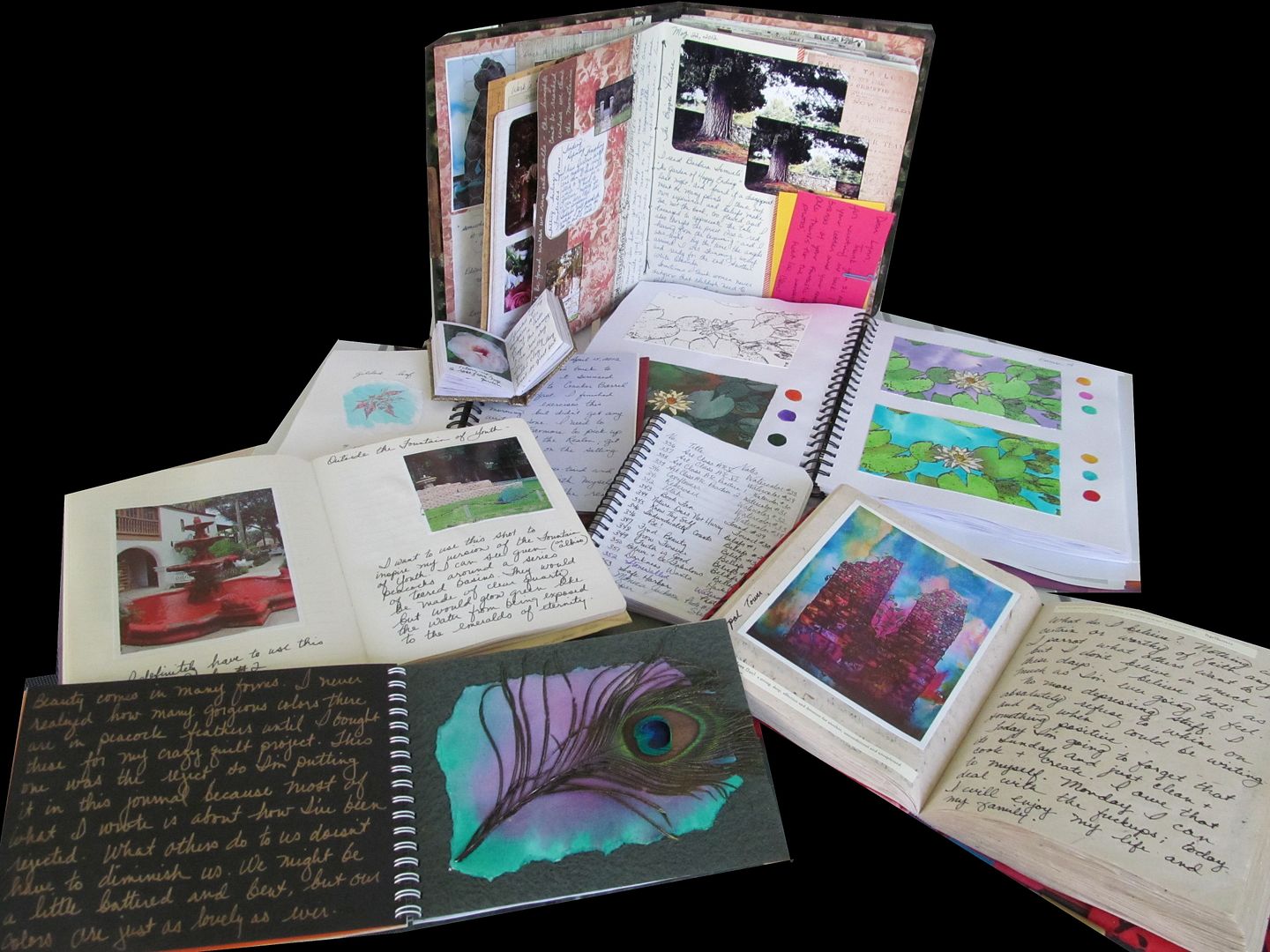 Journals and notebooks have been my daily writing companions since I was a teen. In addition to PBW, I keep a personal journal, at least three novel notebooks, one or two series bibles, a photo album, an art project book and a quilting diary. Now and then I'll also break out my current venting journal (for anger management), my belief & prayer journal (ditto) or my idea binder to contain the overflow. They're generally messy, overstuffed volumes of things that matter only to me; catch-alls for my creative work and anything else lingering on my mind. The only exceptions are the journals I write for other people now and then; I try to keep those a little neater for the recipient.
Journals and notebooks have been my daily writing companions since I was a teen. In addition to PBW, I keep a personal journal, at least three novel notebooks, one or two series bibles, a photo album, an art project book and a quilting diary. Now and then I'll also break out my current venting journal (for anger management), my belief & prayer journal (ditto) or my idea binder to contain the overflow. They're generally messy, overstuffed volumes of things that matter only to me; catch-alls for my creative work and anything else lingering on my mind. The only exceptions are the journals I write for other people now and then; I try to keep those a little neater for the recipient. I think regular journaling or notebooking is a good habit for a writer to develop. I constantly refer to my novel notebooks and series Bibles as they're invaluable repositories of story history, especially when I'm working on a lengthy series. As series writers know it's not always possible to remember every single detail from each book; keeping a running record of your ideas, outlines, research, character and plot development etc. from each volume can provide valuable reference info for future installments.
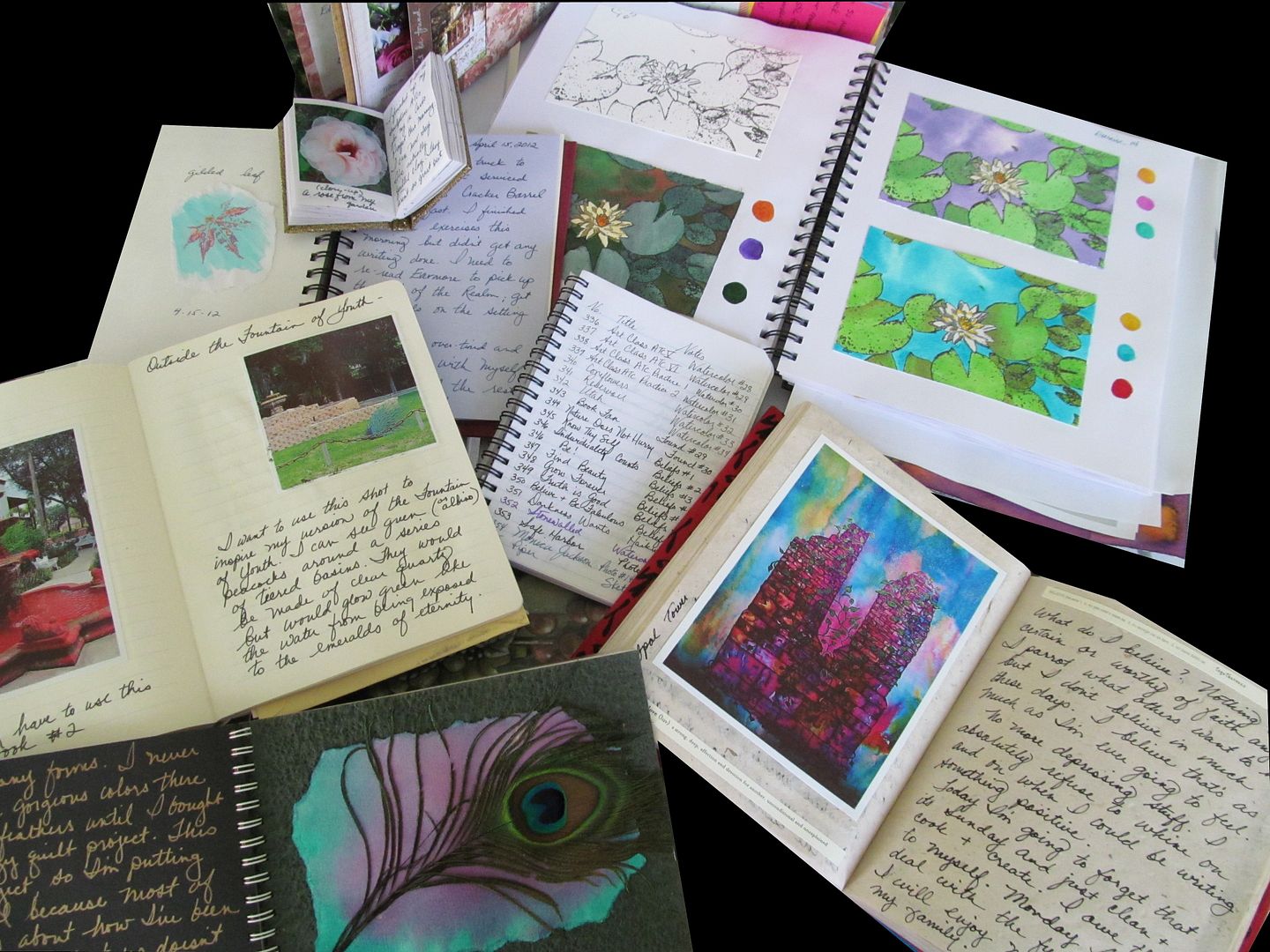 I don't often look back through my personal journals, but when I do it's generally to remind myself of how I've managed some challenge from the past. By revisiting my personal history I often find new motivations -- and sometimes good ideas -- on how to approach, handle, or resolve a situation in the present. When there aren't any answers to be had, rereading those old journals help me get a better handle on accepting the things none of us can change. I always want to fix things, and I get frustrated when I can't, so occasionally I need a reminder that not all problems can be solved.
I don't often look back through my personal journals, but when I do it's generally to remind myself of how I've managed some challenge from the past. By revisiting my personal history I often find new motivations -- and sometimes good ideas -- on how to approach, handle, or resolve a situation in the present. When there aren't any answers to be had, rereading those old journals help me get a better handle on accepting the things none of us can change. I always want to fix things, and I get frustrated when I can't, so occasionally I need a reminder that not all problems can be solved.This quest has given me a whole new appreciation of the ready-made blank journals and notebooks available to purchase -- and so have your comments. I would never have discovered all the amazing journals published by Chronicle Books without Diana Gillette's recommendation, and look what I would have missed out on:
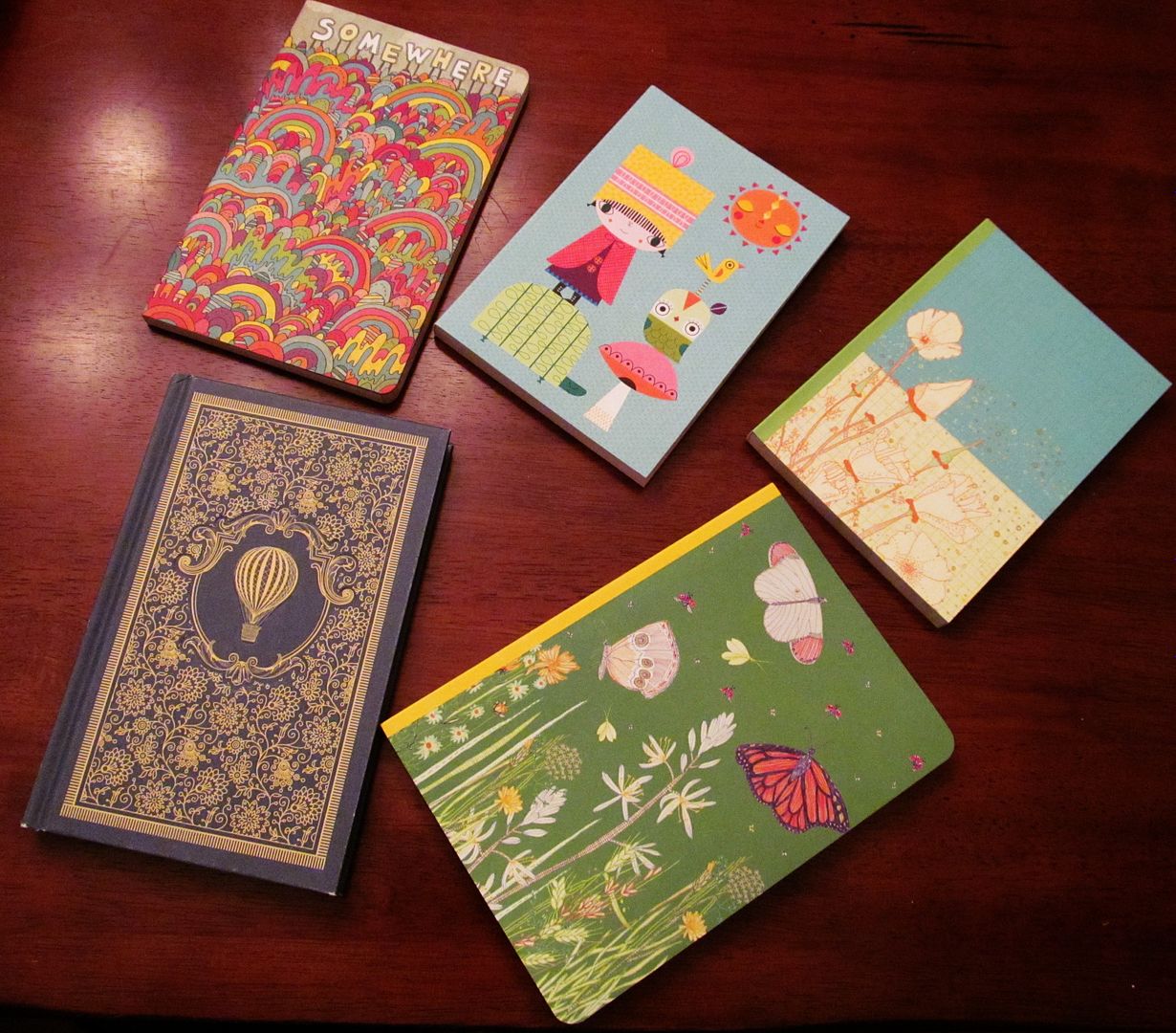
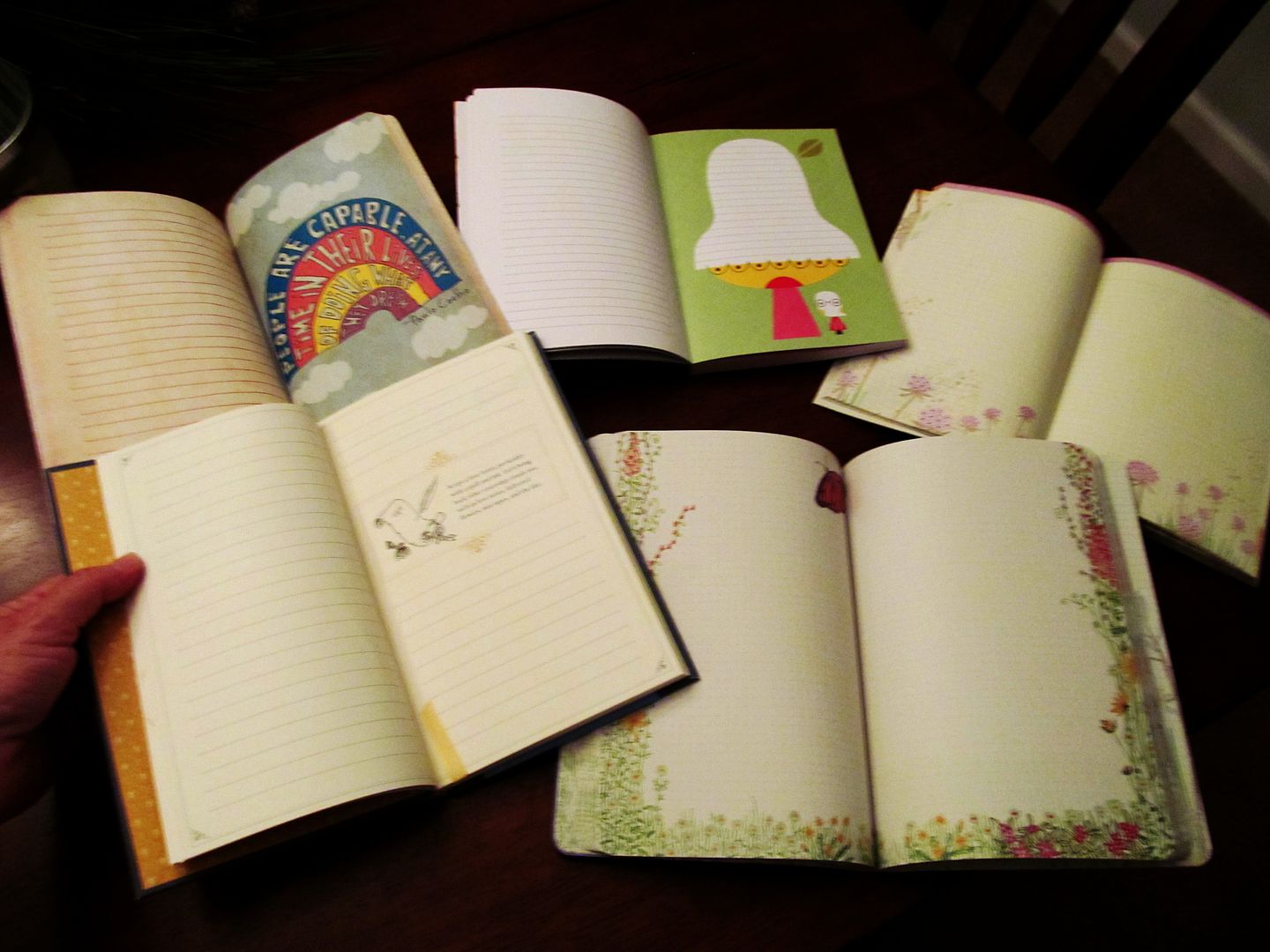
My quest will continue, too, as there are always new products to be discovered, like these Fantasy Art, Doodling and Life Log journals found during my last visit to BAM:
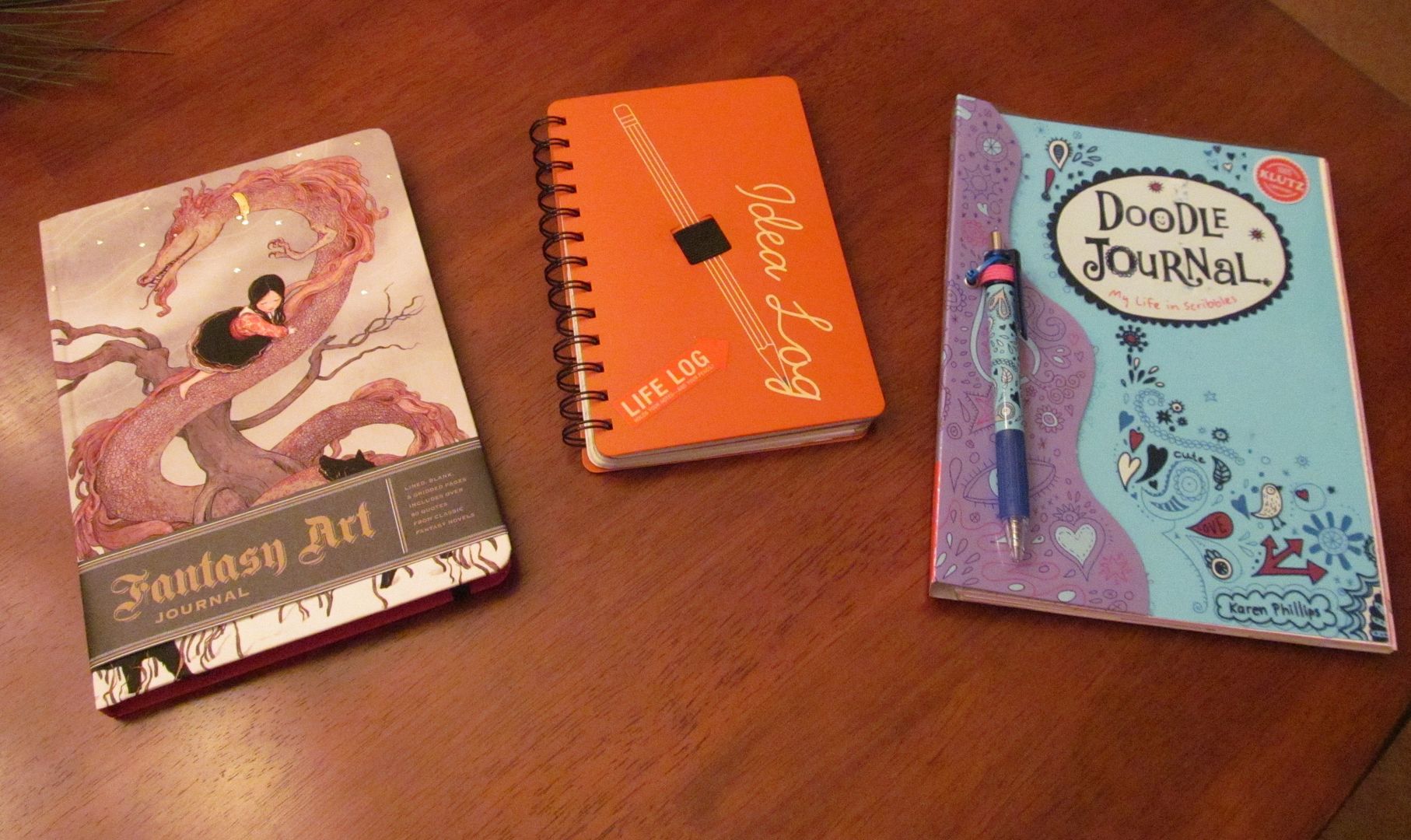
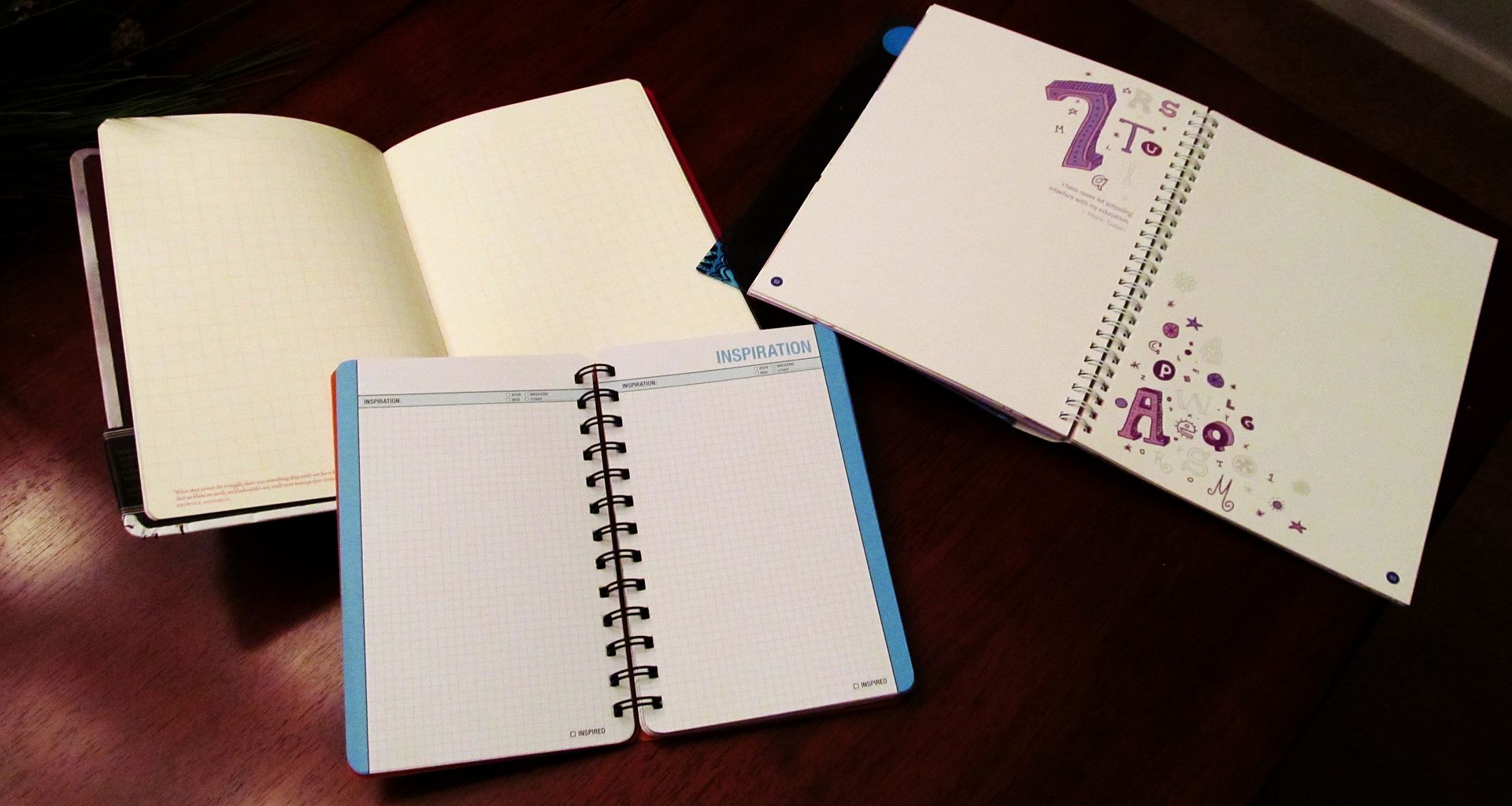
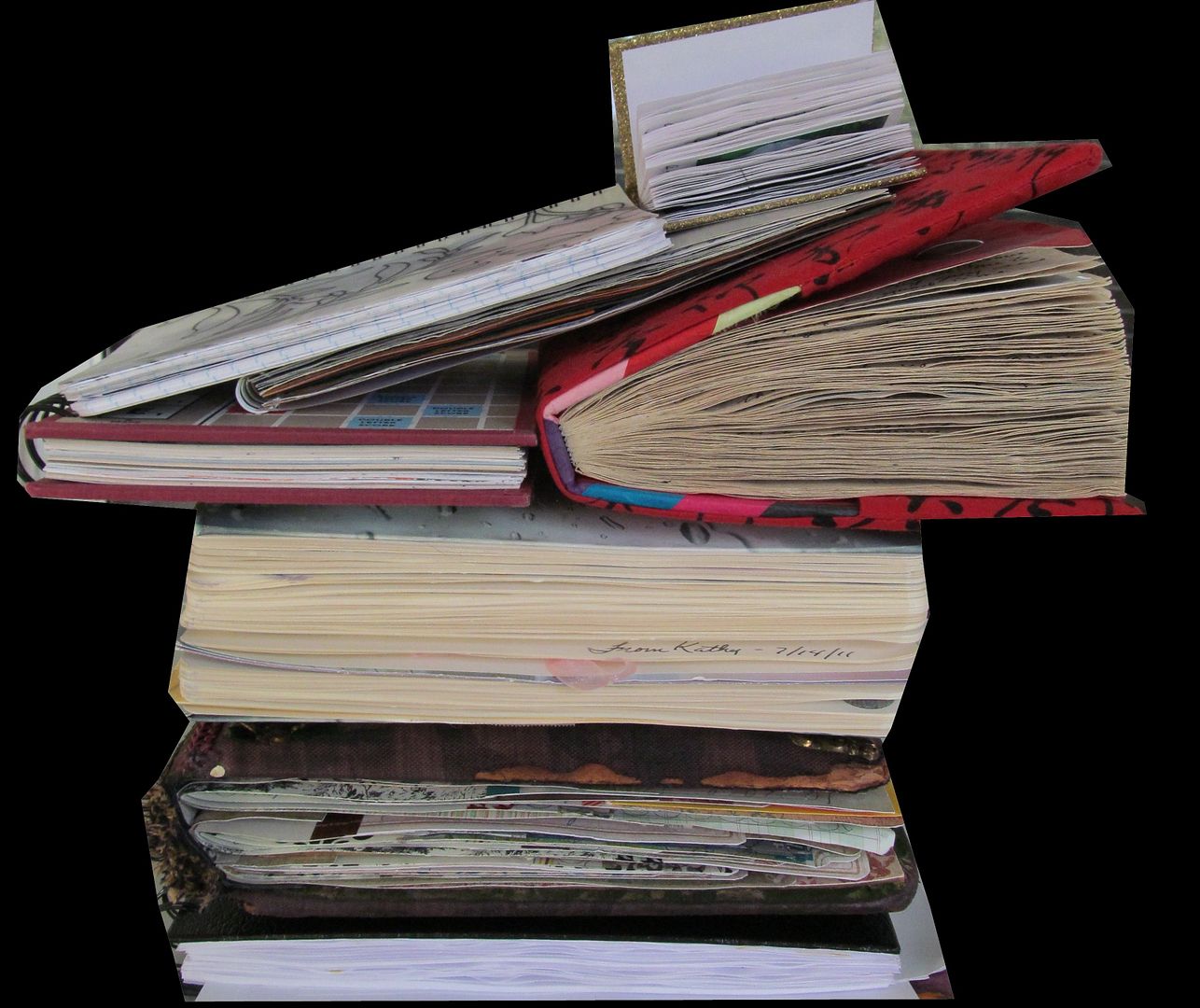 It takes time to create a written record of anything; preserving it for future generations -- even if it's only for the benefit of your own descendants -- takes more effort. If you keep at it you get into the habit, though, and after thirty years of creating my personal chronicles it's become so much a part of my daily routine that I don't even really think about it anymore. In time you will have to think about storage issues -- this stack here represents about six months worth of just the personal side of my journaling -- but that's where technology might actually prove useful, as you can elect to scan your paper journals and notebooks and instead save electronic copies of them.
It takes time to create a written record of anything; preserving it for future generations -- even if it's only for the benefit of your own descendants -- takes more effort. If you keep at it you get into the habit, though, and after thirty years of creating my personal chronicles it's become so much a part of my daily routine that I don't even really think about it anymore. In time you will have to think about storage issues -- this stack here represents about six months worth of just the personal side of my journaling -- but that's where technology might actually prove useful, as you can elect to scan your paper journals and notebooks and instead save electronic copies of them.To help some of you get started I'm having a not-so-blank journal and notebook giveaway today. In comments to this post tell us how you'd use a new journal or notebook by midnight EST on Friday, September 28, 2012. I'll draw three names at random from everyone who participates and send the winners one of the journals or notebooks I've found since beginning my quest (you won't know which until it arrives, so it will be a surprise.) This giveaway is open to everyone on the planet, even if you've won something here at PBW in the past.
Wednesday, September 26, 2012
Not-So-Blank Notebooks
Hunting around for not-so-blank journals made me realize that notebooks are changing, too. For years writers as well as school kids have depended on the ruled white pages of composition books and spiral-bound notebooks to contain their scribbles; I've used hundreds, possibly thousands of them myself. Finding new and creative versions of these old standbys delighted me, mainly because I didn't expect to see notebooks change -- but they have, and in wonderfully imaginative ways:
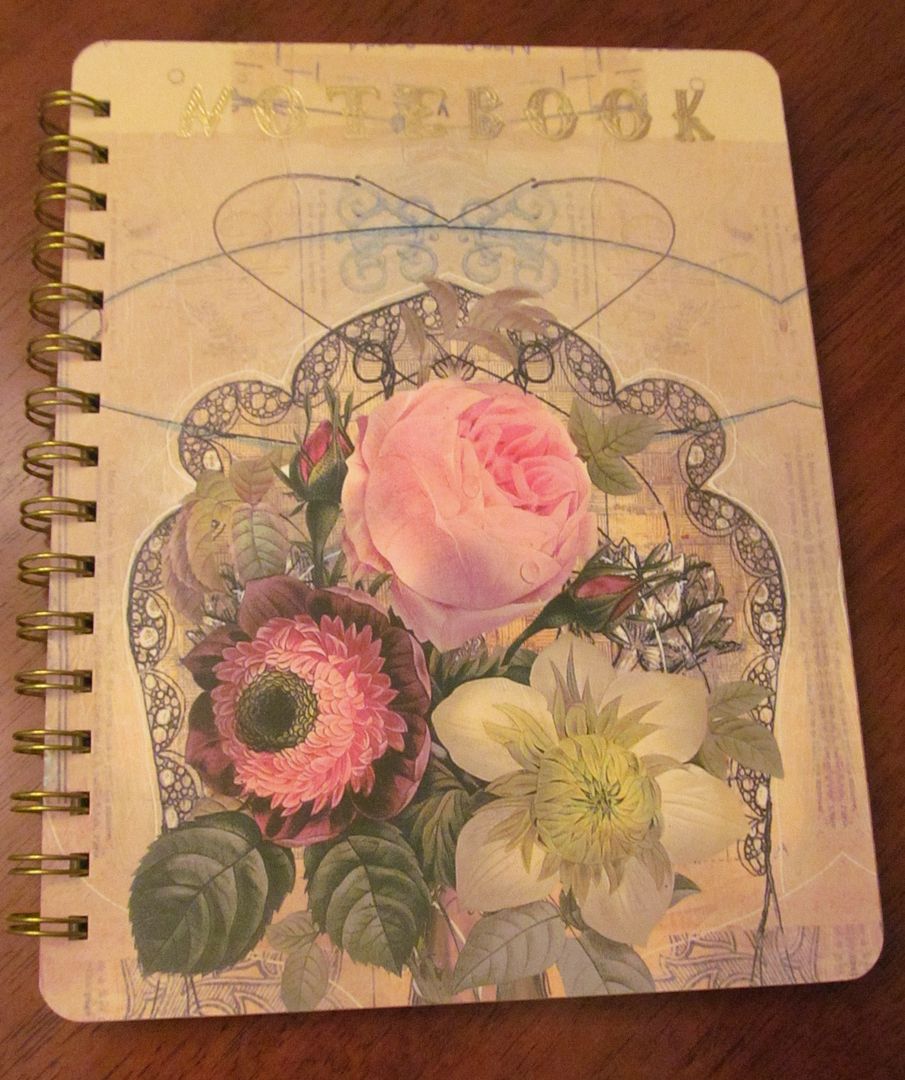
This composition-size spiral-bound notebook has an antique look to it, but the real surprise is between the covers:
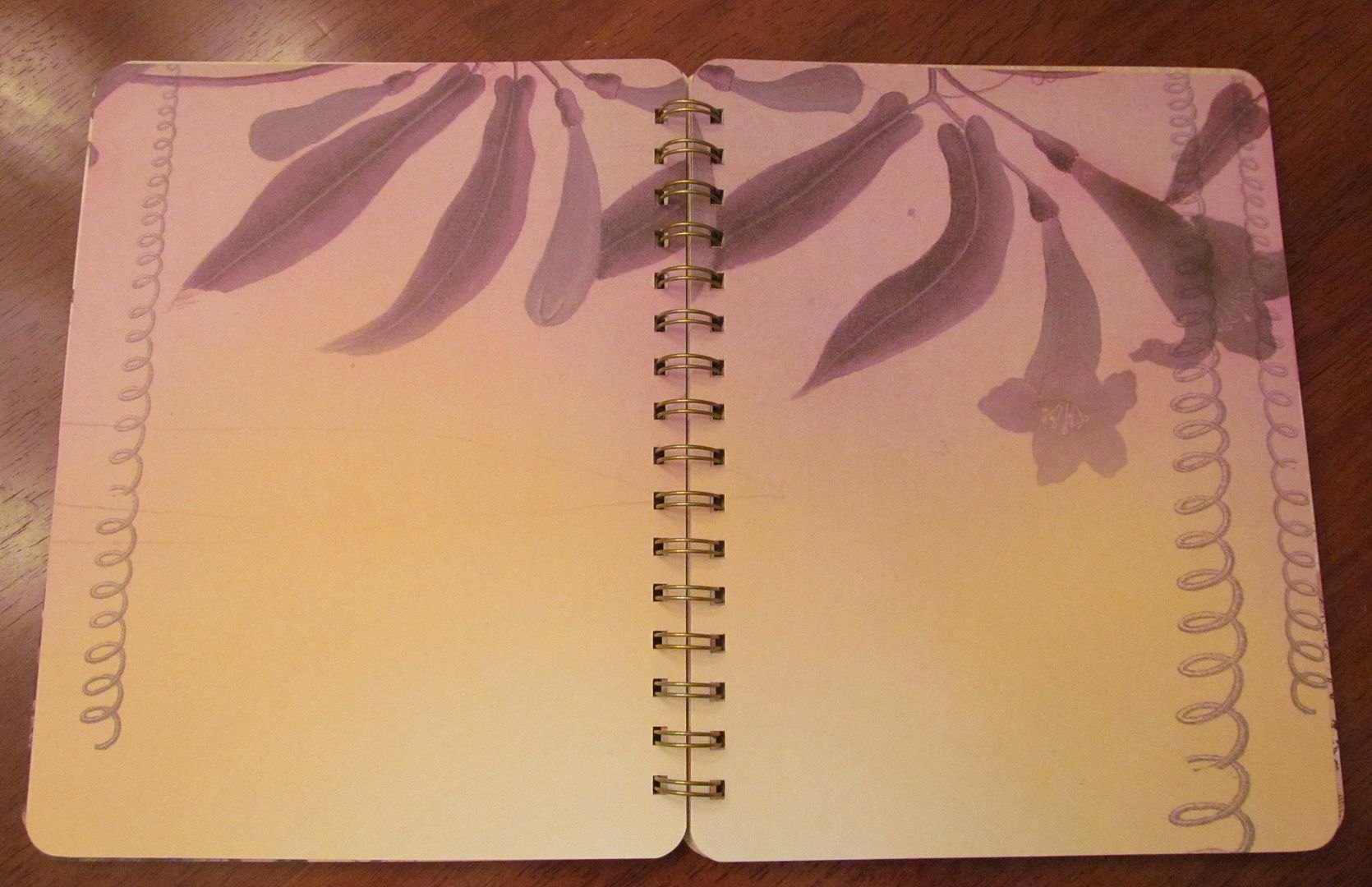
Instead of the usual white ruled pages, this notebook has pages printed with four different colors and artistic designs. What it doesn't have is a single line, so you have plenty of room to write, sketch, mount photos or images and otherwise fill the pages however you like. From Papaya Art; I got mine for $10.76 at my local art store.
You don't have to shop at an art store to find interesting notebooks; I found these two at Target for under $10.00:
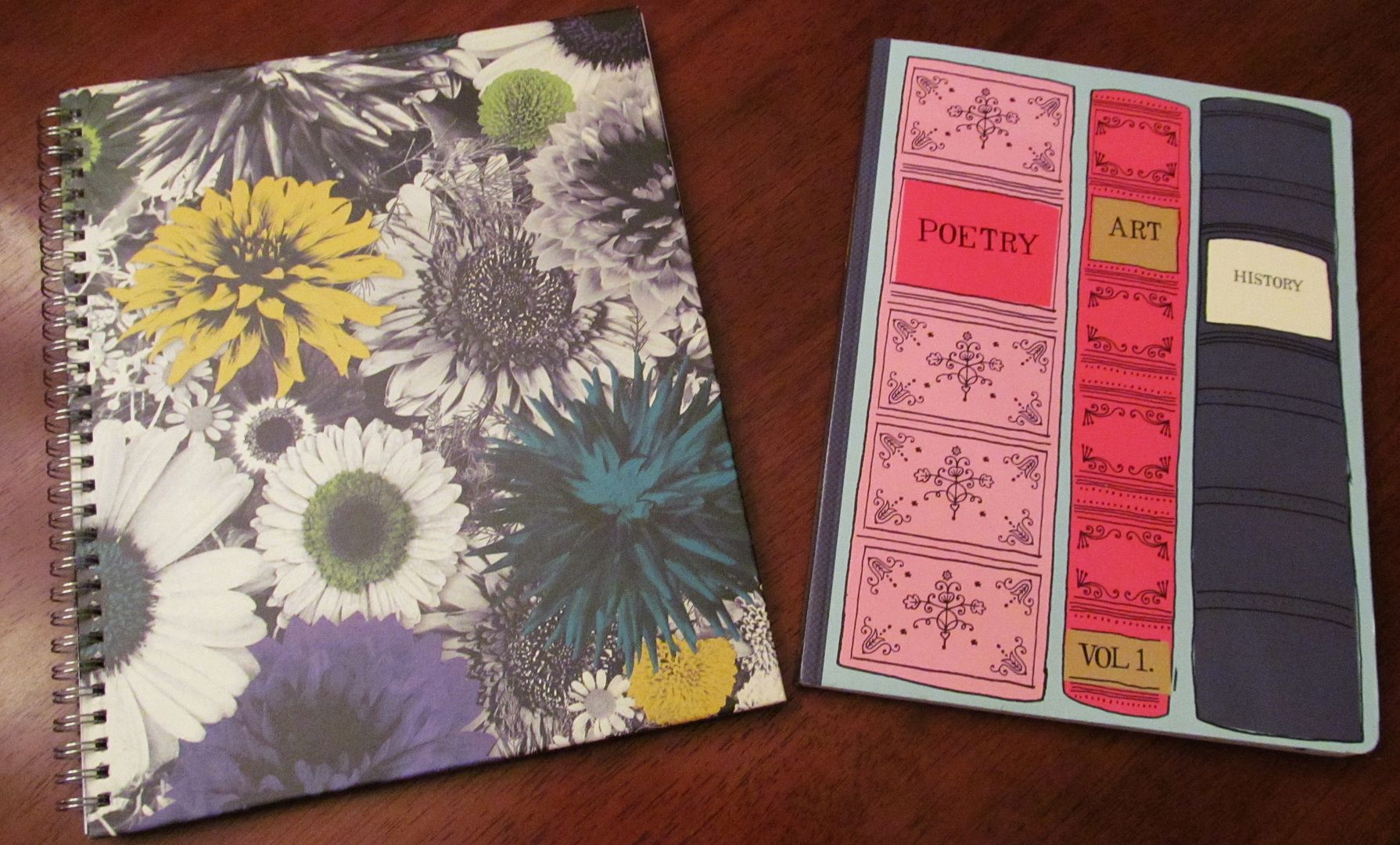
The inside pages of the notebook with the flower cover have light gray dots instead of the usual lines (handy for anyone who wants to work out maps or other types of drawings on a gridded surface) while the Poetry/Art/History composition book offers a more elegant spin on ruled pages:
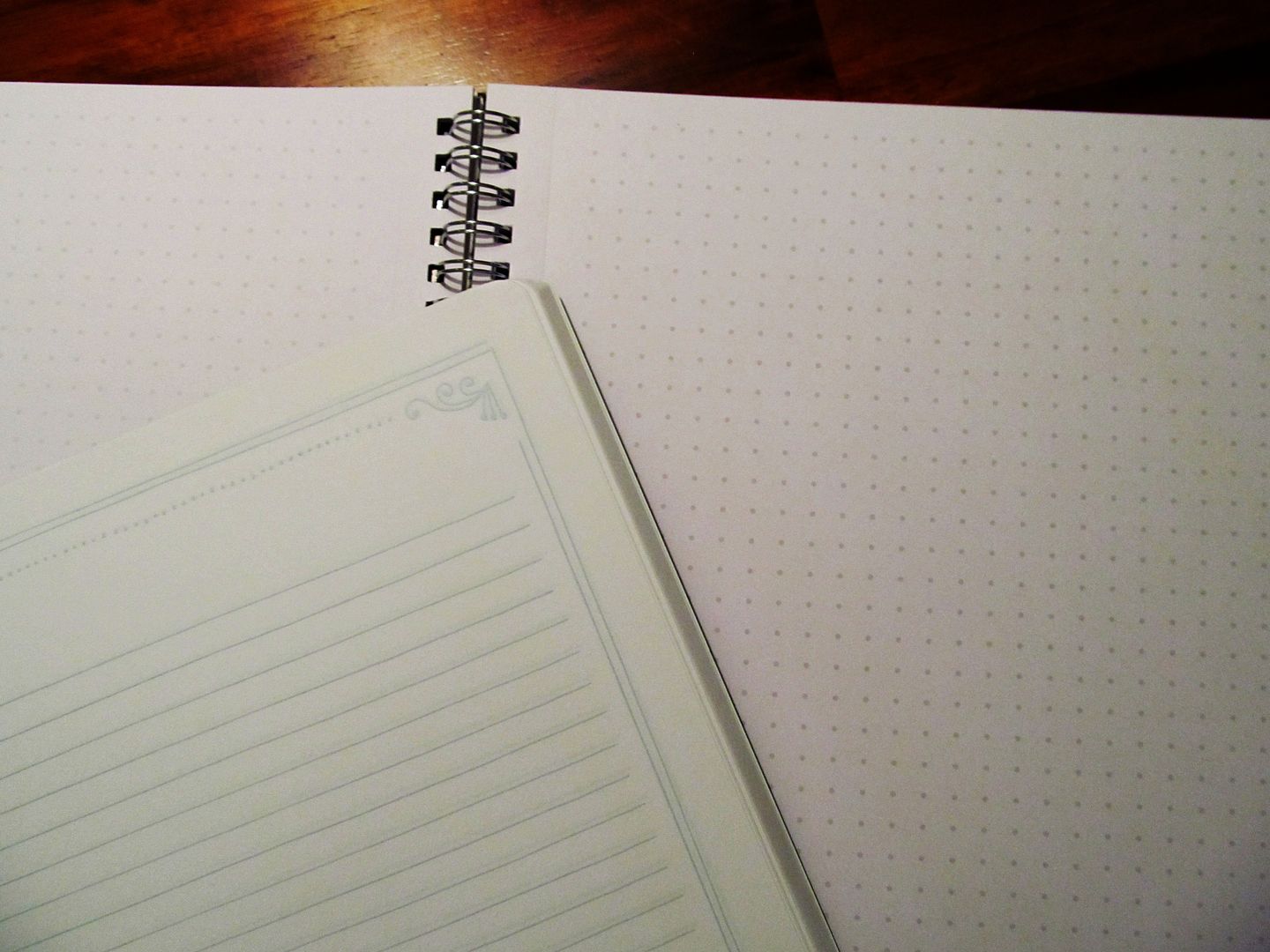
One trick I'm learning is to look for unusual notebooks in places other than the office supply shops and aisles. I found this notebook with colored, printed and plain white pages at an art supply store; it's sold as an art journal kit but would work great as a notebook. While gathering school supplies for my kid, I noticed Crayola had put out various sizes of what looked to be a pretty standard spiral-bound notebook. Which it is, until you write on a page with the pen provided by Crayola, and bring out the psychedelic colors embedded in every inch of the paper.
If you don't find the notebooks you want to use, you can begin making your own. Collect interesting papers until you have a nice stack, punch holes in them and place them in folder with grommets or a slim binder, and you've got your own notebook. If you'd like to spiral bind them, you can have that done at most printing service outlets; Office Depot also has a number of spiral binding machines you can purchase and use at home to put together your own notebooks; I even found a video over on YouTube that demonstrates how one of the them works.
Tomorrow I'll wrap up my quest with one final look at some of the other not-so-blank books I've found and the giveaway I promised, so stop in if you get a chance. (Those of you who are addicted to notebooks might also like to visit Nifty's Notebook Stories blog to see what other writers all over ther planet are using.)

This composition-size spiral-bound notebook has an antique look to it, but the real surprise is between the covers:

Instead of the usual white ruled pages, this notebook has pages printed with four different colors and artistic designs. What it doesn't have is a single line, so you have plenty of room to write, sketch, mount photos or images and otherwise fill the pages however you like. From Papaya Art; I got mine for $10.76 at my local art store.
You don't have to shop at an art store to find interesting notebooks; I found these two at Target for under $10.00:

The inside pages of the notebook with the flower cover have light gray dots instead of the usual lines (handy for anyone who wants to work out maps or other types of drawings on a gridded surface) while the Poetry/Art/History composition book offers a more elegant spin on ruled pages:

One trick I'm learning is to look for unusual notebooks in places other than the office supply shops and aisles. I found this notebook with colored, printed and plain white pages at an art supply store; it's sold as an art journal kit but would work great as a notebook. While gathering school supplies for my kid, I noticed Crayola had put out various sizes of what looked to be a pretty standard spiral-bound notebook. Which it is, until you write on a page with the pen provided by Crayola, and bring out the psychedelic colors embedded in every inch of the paper.
If you don't find the notebooks you want to use, you can begin making your own. Collect interesting papers until you have a nice stack, punch holes in them and place them in folder with grommets or a slim binder, and you've got your own notebook. If you'd like to spiral bind them, you can have that done at most printing service outlets; Office Depot also has a number of spiral binding machines you can purchase and use at home to put together your own notebooks; I even found a video over on YouTube that demonstrates how one of the them works.
Tomorrow I'll wrap up my quest with one final look at some of the other not-so-blank books I've found and the giveaway I promised, so stop in if you get a chance. (Those of you who are addicted to notebooks might also like to visit Nifty's Notebook Stories blog to see what other writers all over ther planet are using.)
Tuesday, September 25, 2012
Sub Ops Duo
Crossed Genres has an interesting open call for SF and/or Fantasy speculative fiction novellas featuring tales of older women: "We’re looking for speculative stories featuring women of advancing age (late middle age and older). They’re smart, they’re tough, and they have wills of their own. They may be warriors, politicians, adventurers, etc. Even if they are also wives, mothers, wise women or healers, those archetypes must not be their defining characteristics. Their motivations, their driving force, must be their own. Whatever was in their past, they’re not interested in being in the background now. We want stories about women breaking free of suppression; we also want stories of women who’ve been empowered all their lives. We welcome and strongly encourage submissions with underrepresented main characters: characters of color, LGBTQ characters, etc." Length: 17.5-40K (firm); Payment: "$0.01 per word, plus one print copy & the ebook." No reprints, electronic submission via online form only, see guidelines for more details. Deadline: October 31, 2012
Postscripts to Darkness has a standing open call for "works of short (up to 3500 words) fiction for our soon-to-be twice yearly publication. We are currently open to submissions for volume 4, which will be published in the fall of 2013. We are open to a variety of approaches and styles, but are interested in original work that pushes and plays with(in) the boundaries of the fantastic, the marvelous, the uncanny, and the horrific. We are not interested in formulaic re-treads of genre conventions, but in work that revises and interrogates the relationship between genre writing and literary experimentation." Payment: "As of Volume 4, we will offer fiction contributors $25 per story (payable through PayPal), regardless of length. We will also provide a complimentary pdf version of the book to each contributor. Contributors also have the option of purchasing more copies at a low contributor’s rate (30% off.)" No reprints, electronic submission only, see guidelines for more details.
Both of these ops were found among the marvelous market listings at Ralan.com.
Postscripts to Darkness has a standing open call for "works of short (up to 3500 words) fiction for our soon-to-be twice yearly publication. We are currently open to submissions for volume 4, which will be published in the fall of 2013. We are open to a variety of approaches and styles, but are interested in original work that pushes and plays with(in) the boundaries of the fantastic, the marvelous, the uncanny, and the horrific. We are not interested in formulaic re-treads of genre conventions, but in work that revises and interrogates the relationship between genre writing and literary experimentation." Payment: "As of Volume 4, we will offer fiction contributors $25 per story (payable through PayPal), regardless of length. We will also provide a complimentary pdf version of the book to each contributor. Contributors also have the option of purchasing more copies at a low contributor’s rate (30% off.)" No reprints, electronic submission only, see guidelines for more details.
Both of these ops were found among the marvelous market listings at Ralan.com.
Monday, September 24, 2012
Flea Market Ten
Ever see a silky chicken? Me neither, at least until last weekend. Here's a peek included with:
Ten (Odd) Things I Found at the Flea Market
Ten (Odd) Things I Found at the Flea Market
Sunday, September 23, 2012
Winner
I think the magic hat has a weird sense of humor sometimes, as the winner of the Later Reading giveaway turned out to be someone to whom I just sent a package (yesterday, in fact) unrelated to blog stuff:
Shiloh Walker, who wrote: I kept Endurance tucked away for almost a year because I was afraid of what you were going to do to Joey.
Shiloh, you don't have to send me your info, I got it, lol. My thanks to everyone for joining in.
Shiloh Walker, who wrote: I kept Endurance tucked away for almost a year because I was afraid of what you were going to do to Joey.
Shiloh, you don't have to send me your info, I got it, lol. My thanks to everyone for joining in.
Saturday, September 22, 2012
Lemming Writing
I got an e-mail from an yet-to-be-pubbed writer who asked me an interesting question (and gave me permission to post it on the blog): "So if all anyone wants to read is mommy porn, shouldn't I be writing it to better my chances at publishing?"
I (correctly) deduced the phrase mommy porn to mean the particular fanfic-based erotica that has sold so briskly of late, and thought for a while about how to respond. After nearly 15 years in the biz I've seen a lot of trends come and go: romantic suspense, fashion chicklit, vampire romance, vampire brotherhoods, vampire bromances, YA written for adults, and now the mommy porn thing. Likewise I've watched countless writers rush up that cliff of popularity and dive off because they saw a lot of other writers take the jump and thought, "Hey, maybe that will work." In the biz we call it jumping on the bandwagon; I think of it more as lemming writing.
Taking advantage of a publishing trend can absolutely open some doors for you. A couple of weeks ago one of my biz associates mentioned to me that editors were so hot for BDSM erotica that if I wanted it I could probably get a contract within a week. Recently my agent made a similar comment. It took me almost three years of traditional submission to sell my latest series; it would be nice to sell something else in a week. Very nice, in fact. If I could land an offer and bulk up my numbers with a fast seller, it would likely do great things for my other works.
Unfortunately it won't, as I seriously doubt I'll ever write BDSM erotica, mommy porn or whatever you want to call it. I'm not a snob; I like well-written books of any variety regardless of genre. I can write just about anything, too. But I won't be making like a lemming for the same reason I don't publish Westerns, Christian chicklit or political thrillers: I have zero interest in writing it.
Publishing certainly likes fiction that is riding a wave of popularity, but you need to watch it closely and decide when its trends are most advantageous to you and what you want most to write. For example, I originally pitched my Darkyn novels back in the late 90's, and all I got was a resounding rejection. It was what I wanted to write, but vampire fiction didn't sell much back then, so the bounce was simply a good business decision (not only for the publisher but for me, too; I doubt at the time the series would have lasted past book three.) I shelved the idea and moved on. When the vampire fic trend kicked off six years later, I tried submitting my proposal again and landed a three-book contract in a couple weeks. By timing this right I also had time to establish my series before the genre became glutted.
This doesn't mean I haven't eyed a few cliffs myself. From time to time I've been tempted by certain trends because some of them were vaguely interesting, and I knew if I researched and focused I could do a decent job of it. It's hard to resist a situation that practically guarantees you'll get an offer in order to find that that one editor among hundreds who wants to buy exactly what you want to write. The way the economy is going I don't blame anyone for going for the easier sell; you do what you have to in order to pay your bills and take care of your family.
Trend-driven writing's major downside has to do with how whatever you publish brands you. If all you've ever sold is mommy porn, publishers are going to focus on that as your niche, and it will be very difficult to persuade them that you can publish anything else successfully. It's much tougher for a pubbed writer to sell something different from what they've been publishing than it is for a unpubbed writer. Also, if your mommy porn doesn't do especially well on the market, those low numbers will make you look even less appealing to a publisher than an unpublished writer; booksellers use those numbers to decide how much they want to order of your new venture (aka not much.) If you're bright/shiny/new with no sales track record, the buyers can only judge you on the strength of the work. If you're pubbed, you'll be judged on your numbers.
You pros out there won't escape this, either. Involuntarily branding yourself can happen at any time during your career. The reason it took me three years to sell my latest series is because it's new, fresh, and not like anything I've ever written. Although I'm an established multi-genre writer, the books I've sold in the highest numbers are all vampire fiction, which is also what I'm best known for writing. I probably could have sold a new paranormal series any time over the last three years; a half-dozen editors who rejected my proposal actually wrapped up their bounces by asking me to send them a paranormal sub instead.
If you want to write this mommy porn because it's all you've ever wanted to write, happy days -- this is definitely your time. You're not going to be jumping off a cliff; you'll be pursuing what interests you and possibly what you were meant to write. But if the desire and the interest isn't there, I believe it will show through in the work. A few writers have copy-catted their way to success, but most get swallowed up in the glut at the base of the cliff . . . at least until the latest bandwagon comes along to cart them off to the next one.
I (correctly) deduced the phrase mommy porn to mean the particular fanfic-based erotica that has sold so briskly of late, and thought for a while about how to respond. After nearly 15 years in the biz I've seen a lot of trends come and go: romantic suspense, fashion chicklit, vampire romance, vampire brotherhoods, vampire bromances, YA written for adults, and now the mommy porn thing. Likewise I've watched countless writers rush up that cliff of popularity and dive off because they saw a lot of other writers take the jump and thought, "Hey, maybe that will work." In the biz we call it jumping on the bandwagon; I think of it more as lemming writing.
Taking advantage of a publishing trend can absolutely open some doors for you. A couple of weeks ago one of my biz associates mentioned to me that editors were so hot for BDSM erotica that if I wanted it I could probably get a contract within a week. Recently my agent made a similar comment. It took me almost three years of traditional submission to sell my latest series; it would be nice to sell something else in a week. Very nice, in fact. If I could land an offer and bulk up my numbers with a fast seller, it would likely do great things for my other works.
Unfortunately it won't, as I seriously doubt I'll ever write BDSM erotica, mommy porn or whatever you want to call it. I'm not a snob; I like well-written books of any variety regardless of genre. I can write just about anything, too. But I won't be making like a lemming for the same reason I don't publish Westerns, Christian chicklit or political thrillers: I have zero interest in writing it.
Publishing certainly likes fiction that is riding a wave of popularity, but you need to watch it closely and decide when its trends are most advantageous to you and what you want most to write. For example, I originally pitched my Darkyn novels back in the late 90's, and all I got was a resounding rejection. It was what I wanted to write, but vampire fiction didn't sell much back then, so the bounce was simply a good business decision (not only for the publisher but for me, too; I doubt at the time the series would have lasted past book three.) I shelved the idea and moved on. When the vampire fic trend kicked off six years later, I tried submitting my proposal again and landed a three-book contract in a couple weeks. By timing this right I also had time to establish my series before the genre became glutted.
This doesn't mean I haven't eyed a few cliffs myself. From time to time I've been tempted by certain trends because some of them were vaguely interesting, and I knew if I researched and focused I could do a decent job of it. It's hard to resist a situation that practically guarantees you'll get an offer in order to find that that one editor among hundreds who wants to buy exactly what you want to write. The way the economy is going I don't blame anyone for going for the easier sell; you do what you have to in order to pay your bills and take care of your family.
Trend-driven writing's major downside has to do with how whatever you publish brands you. If all you've ever sold is mommy porn, publishers are going to focus on that as your niche, and it will be very difficult to persuade them that you can publish anything else successfully. It's much tougher for a pubbed writer to sell something different from what they've been publishing than it is for a unpubbed writer. Also, if your mommy porn doesn't do especially well on the market, those low numbers will make you look even less appealing to a publisher than an unpublished writer; booksellers use those numbers to decide how much they want to order of your new venture (aka not much.) If you're bright/shiny/new with no sales track record, the buyers can only judge you on the strength of the work. If you're pubbed, you'll be judged on your numbers.
You pros out there won't escape this, either. Involuntarily branding yourself can happen at any time during your career. The reason it took me three years to sell my latest series is because it's new, fresh, and not like anything I've ever written. Although I'm an established multi-genre writer, the books I've sold in the highest numbers are all vampire fiction, which is also what I'm best known for writing. I probably could have sold a new paranormal series any time over the last three years; a half-dozen editors who rejected my proposal actually wrapped up their bounces by asking me to send them a paranormal sub instead.
If you want to write this mommy porn because it's all you've ever wanted to write, happy days -- this is definitely your time. You're not going to be jumping off a cliff; you'll be pursuing what interests you and possibly what you were meant to write. But if the desire and the interest isn't there, I believe it will show through in the work. A few writers have copy-catted their way to success, but most get swallowed up in the glut at the base of the cliff . . . at least until the latest bandwagon comes along to cart them off to the next one.
Friday, September 21, 2012
Destiny
This inventive animation is a terrific example of how to tell a story without a single line of dialogue (music and sound effects in the background, for those of you at work):
Destiny from Bellecour 3D on Vimeo.
Destiny from Bellecour 3D on Vimeo.
Thursday, September 20, 2012
Later Reading
Last week petite mentioned Bill Bryson last week as an author who makes his readers happy, and I have to chime in on that. I've been a diehard Bryson groupie since the first time I read A Sunburned Country, and I will buy anything the man cares to publish the minute I see it on the shelves. Doesn't matter what it is; if I saw "Bryson's Weekly Grocery List" I'd grab that, too.
I don't read Bill's books right away, however. Most of the time I put them in clear view of my desk and use them as writing carrots (i.e. when I finish a manuscript, I get to read one of them as a reward.) Others I reserve for reading during long trips away from home, or hold onto until I have a bad case of the blues; the old "save it for a rainy day" approach.
In this era of get-it-with-one-click the practice of deliberately saving books for later reading seems to have dwindled to the point of vanishing altogether. While I appreciate the technology that allows us to get most any book we want the moment we want it, I think it's changing a lot of what used to be gleeful anticipation into surly impatience.
I'm guilty of this myself; for about a year I've been waiting/hoping to read an e-book by a favorite author who went indie; I've been checking Smashwords monthly to see if it's released there in .pdf (which I had planned to print out at home, as has been my habit with every indie author e-book I want to read.) For the last twelve months I've been willing to wait, but since my family stuck me with this e-reader and I don't have to wait for a printer-friendly edition anymore I've noticed I've been getting grumpier -- and more impatient -- by the week. It's out in Kindle format, so why doesn't the author release it for Nook? Why do I still have to wait? Maybe I should complain . . .
 Before the era of instant delivery I never minded -- or even noticed -- the time it took to acquire books I wanted to read. When I was younger and much poorer I had to sign up on a waiting list at the library, and when the call came that my book was available I was thrilled. If I couldn't find a novel by someone I loved, I used the time as a chance to discover new authors. I used to spend years hunting through used book stores for OOPs editions while slowly acquiring an author's entire backlist. It was a bit like treasure hunting, and I absolutely loved it, especially whenever I found the very last book I needed to complete a collection. So were my trips to the brick-and-mortars, when browsing for titles was always punctuated by the delights of finding new releases I didn't know were coming out.
Before the era of instant delivery I never minded -- or even noticed -- the time it took to acquire books I wanted to read. When I was younger and much poorer I had to sign up on a waiting list at the library, and when the call came that my book was available I was thrilled. If I couldn't find a novel by someone I loved, I used the time as a chance to discover new authors. I used to spend years hunting through used book stores for OOPs editions while slowly acquiring an author's entire backlist. It was a bit like treasure hunting, and I absolutely loved it, especially whenever I found the very last book I needed to complete a collection. So were my trips to the brick-and-mortars, when browsing for titles was always punctuated by the delights of finding new releases I didn't know were coming out.
Saving books I buy for later reading may be the only way to get back a little of that lovely feeling of anticipation, so I've started a Rainy Day Reads shelf in my book room. Marjorie Liu just published Where the Heart Lives, a short story on Smashwords that I've never read; that along with Bryson's At Home are the first two additions.
What books or authors would you put on your Later Reading shelf? Tell us in comments to this post (or if you can't think of any, just toss your name in the hat) by midnight EST on Saturday, September 22, 2012. I'll draw one name at random from everyone who participates and send the winner a signed manuscript copy of Nightbred, my upcoming December release (bound by me in a ring binder, and whether the winner reads it right away or saves it for a rainy day is his/her choice) This giveaway is open to everyone on the planet, even if you've won something here at PBW in the past.
I don't read Bill's books right away, however. Most of the time I put them in clear view of my desk and use them as writing carrots (i.e. when I finish a manuscript, I get to read one of them as a reward.) Others I reserve for reading during long trips away from home, or hold onto until I have a bad case of the blues; the old "save it for a rainy day" approach.
In this era of get-it-with-one-click the practice of deliberately saving books for later reading seems to have dwindled to the point of vanishing altogether. While I appreciate the technology that allows us to get most any book we want the moment we want it, I think it's changing a lot of what used to be gleeful anticipation into surly impatience.
I'm guilty of this myself; for about a year I've been waiting/hoping to read an e-book by a favorite author who went indie; I've been checking Smashwords monthly to see if it's released there in .pdf (which I had planned to print out at home, as has been my habit with every indie author e-book I want to read.) For the last twelve months I've been willing to wait, but since my family stuck me with this e-reader and I don't have to wait for a printer-friendly edition anymore I've noticed I've been getting grumpier -- and more impatient -- by the week. It's out in Kindle format, so why doesn't the author release it for Nook? Why do I still have to wait? Maybe I should complain . . .
 Before the era of instant delivery I never minded -- or even noticed -- the time it took to acquire books I wanted to read. When I was younger and much poorer I had to sign up on a waiting list at the library, and when the call came that my book was available I was thrilled. If I couldn't find a novel by someone I loved, I used the time as a chance to discover new authors. I used to spend years hunting through used book stores for OOPs editions while slowly acquiring an author's entire backlist. It was a bit like treasure hunting, and I absolutely loved it, especially whenever I found the very last book I needed to complete a collection. So were my trips to the brick-and-mortars, when browsing for titles was always punctuated by the delights of finding new releases I didn't know were coming out.
Before the era of instant delivery I never minded -- or even noticed -- the time it took to acquire books I wanted to read. When I was younger and much poorer I had to sign up on a waiting list at the library, and when the call came that my book was available I was thrilled. If I couldn't find a novel by someone I loved, I used the time as a chance to discover new authors. I used to spend years hunting through used book stores for OOPs editions while slowly acquiring an author's entire backlist. It was a bit like treasure hunting, and I absolutely loved it, especially whenever I found the very last book I needed to complete a collection. So were my trips to the brick-and-mortars, when browsing for titles was always punctuated by the delights of finding new releases I didn't know were coming out.Saving books I buy for later reading may be the only way to get back a little of that lovely feeling of anticipation, so I've started a Rainy Day Reads shelf in my book room. Marjorie Liu just published Where the Heart Lives, a short story on Smashwords that I've never read; that along with Bryson's At Home are the first two additions.
What books or authors would you put on your Later Reading shelf? Tell us in comments to this post (or if you can't think of any, just toss your name in the hat) by midnight EST on Saturday, September 22, 2012. I'll draw one name at random from everyone who participates and send the winner a signed manuscript copy of Nightbred, my upcoming December release (bound by me in a ring binder, and whether the winner reads it right away or saves it for a rainy day is his/her choice) This giveaway is open to everyone on the planet, even if you've won something here at PBW in the past.
Wednesday, September 19, 2012
Two Christian YA ops
Abingdon Press is launching a Christian YA line in 2014 and is looking to acquire in early 2013 high-quality books written for 14 to 19 year olds; would especially like to see series books as well as steampunk, medieval fantasy and urban fantasy. They note on their website that they accept submissions only through agents or from writers who meet with their editors at conferences, so if you don't have an agent you might want to see if you can swing an editor appointment at one of your local Christian writer conferences.
OakTara wants to see Christian YA fantasy, sci-fi, realistic fiction, medieval fantasy series aimed at boys, issue fiction and teen writers; they are eager to acquire "really good" teen writers and fiction written for male readers. They do accept unagented submissions, see more about their guidelines for writers here.
(Notes on both of these sub ops were found in the August 27th issue of Publishers Weekly; I chased down the links myself.)
OakTara wants to see Christian YA fantasy, sci-fi, realistic fiction, medieval fantasy series aimed at boys, issue fiction and teen writers; they are eager to acquire "really good" teen writers and fiction written for male readers. They do accept unagented submissions, see more about their guidelines for writers here.
(Notes on both of these sub ops were found in the August 27th issue of Publishers Weekly; I chased down the links myself.)
Tuesday, September 18, 2012
Writers Visual Dictionary
Because I obviously don't have enough on my plate already, I'm tinkering on a visual dictionary for writers, using photo-metaphors for different aspects of the writing life (sort of like a picture book version of the Devil's Publishing Dictionary.)
Here are some first attempts at entries:
To make it a proper dictionary I need to come up with A to Z terms, and likewise choose one word for concepts like "how it feels to hold your book for the first time" so I've plenty of work ahead. Still, I think it's a fun way to revisit my photo archives and offer a few chuckles for the folks on Flickr.
Does anyone out there have a writer term they'd like to see me define with a photo? Let me know in comments.
Here are some first attempts at entries:
To make it a proper dictionary I need to come up with A to Z terms, and likewise choose one word for concepts like "how it feels to hold your book for the first time" so I've plenty of work ahead. Still, I think it's a fun way to revisit my photo archives and offer a few chuckles for the folks on Flickr.
Does anyone out there have a writer term they'd like to see me define with a photo? Let me know in comments.
Monday, September 17, 2012
Freebie Ten
Ten Things You Can Have for Free
Freeware caution: always scan free downloads of anything for bugs and other threats before dumping the programs into your hard drive.
Softology's Anagram Generator "creates anagrams and lexigrams; generates reverse dictionaries; word search function allows wildcard search on dictionary; allows you to see if your phone number spells anything interesting; searches for palindromes; search for words that rhyme with other words. Ideal for song writers, musicians and poets. Includes English, French, German, Italian, Japanese, Dutch and Spanish dictionaries; solves Jumble puzzles. Saves all results as txt files for future viewing/editing/printing. Non-encrypted dictionaries allow full customisation of words if required. Manually edited English dictionary trimmed to generate interesting anagrams at a much faster speed" (OS: Windows XP/Vista/7)
Clipboard Master is a "handy utility designed to keep all previous texts, pictures and files copied to the clipboard in a list, for later use. Organize your text modules and snippets and paste them in any Windows program whenever you like" (OS: Windows 2000/XP/2003/Vista/2008/7 [32-Bit/64-Bit])
Chronories is a Mac freeware that sounds as if it writes for you: "Note down today's most precious information - or let your Mac do the tedious labour for you. Entering your mood, where you've been and what you did is just a click away. Thanks to Chronories, you will never forget writing your diary again. And if you don't have anything to say? Well, Chronories will gather its fraction of the information anyways and fill in that information for you." [PBW also notes: I'm not sure what to call it (an auto-journaling program?) but if this is something you'd find useful, do check it out.] (OS: Designer notes on web site: "Chronories requires a Mac running Mac OS X 10.5 Leopard, Mac OS X 10.6 Snow Leopard, Mac OS X 10.7 Lion or Mac OS X 10.8 Mountain Lion.")
Compositions is a "a minimalist text editor which allows you to focus on the content. It features a clean white background, and a full screen mode that gets rid of almost all of the interface chrome, leaving just the text on the screen. Using Snapshots, you can take a snapshot of your document at any time, which is saved with the file and available from any device running Compositions. So if you are planning on making large changes to a document, you can snapshot it before hand, and then if you decide to go back, simply restore to the earlier version. Using Dropbox, your documents are kept in sync across all your devices. Any time you are finished with edits, or if you want the latest downloaded to your device, you simply tap the sync button and it will do all the work. If any conflicts arise, it will ask you to resolve them, or you can set it to always auto-resolve. And since the app uses Dropbox, you can always visit Dropbox.com in a browser to restore a deleted file, or go to an earlier version if needed" (OS: Mac OS X)
Elefant Software has an entire page of freeware programs here designed specifically for disabled users; includes several mouse-replacement programs like SteadyMouse for users with hand tremors.
Ian Pegler's FreeFilmSoftware.co.uk web site offers some free screenwriting, story boarding and story writing programs (OS: Windows)
Img Transformer is a "free image resizer, converter and image editing application that can work directly from Windows Explorer. It can open over 30 different image formats. It also works as a normal Windows application, where the user can select the images to convert from a file browser or via drag and drop. Easily change the original image size, format, color depth and resolution and apply adjustments such as brightness,contrast,gamma and individually adjust RGB values. Rotate, flip and resize images in batch mode with a simple right mouse button click - 18 different file output formats are supported including export to PDF. Images can be sharpened or blurred, watermarked, overlaid with text and converted to grayscale, sepia or negative. Crop or change the canvas size and the resolution of images. Settings can be saved as a pre-sets and reapplied to subsequent image transformations. Before applying changes it is possible to view a preview of the result. Custom frames can also be added to images in batch mode" (OS: Windows)
My Daily Digital Journal is a "secure personal journal for everyday inspirational living. Write your daily thoughts, opinions, and life views in your own journal. It also includes a password login dialog box for keeping prying eyes out of your personal business. Insert special characters, emotional icons, pictures, and images into your writing for a more colourful display of your thoughts and ideas. The journal also incorporates an auto save feature for your convenience. There is no need to save your work, it is all done automatically. When you run the application for the first time, simply press enter when the Login window is displayed. You may choose your own password in the settings dialog. Just don't forget your password" (OS: Windows)
Storybook is "a free Open Source novel-writing software for creative writers, novelists and authors. Starting with the plot to the finished book — with Storybook you'll never lose the overview. Storybook helps you to keep an overview of multiple plot-lines while writing books, novels or other written works" (OS: Windows 7/Vista,/XP, Linux)
Writers D'Lite has "just enough functionality to start you on writing that important novel, short-story or article, without any bells and whistles to distract you. Get writing from the first moment you start the application. It has all the important functions and text formatting needed to get you busy. It also has custom page settings for easier viewing of your document. Keep the cursor at eye level for best focus and writing. Full statistics are visible on the status bar, keeping you abreast of your text document as you type. There is also no java or .Net required to run this application, keeping it very small and portable and very useful. It has all the necessary editing short-cut keys for power users. See the blue question mark for more info{F1-key}" (Windows, designer also notes available in a portable version.)
Freeware caution: always scan free downloads of anything for bugs and other threats before dumping the programs into your hard drive.
Softology's Anagram Generator "creates anagrams and lexigrams; generates reverse dictionaries; word search function allows wildcard search on dictionary; allows you to see if your phone number spells anything interesting; searches for palindromes; search for words that rhyme with other words. Ideal for song writers, musicians and poets. Includes English, French, German, Italian, Japanese, Dutch and Spanish dictionaries; solves Jumble puzzles. Saves all results as txt files for future viewing/editing/printing. Non-encrypted dictionaries allow full customisation of words if required. Manually edited English dictionary trimmed to generate interesting anagrams at a much faster speed" (OS: Windows XP/Vista/7)
Clipboard Master is a "handy utility designed to keep all previous texts, pictures and files copied to the clipboard in a list, for later use. Organize your text modules and snippets and paste them in any Windows program whenever you like" (OS: Windows 2000/XP/2003/Vista/2008/7 [32-Bit/64-Bit])
Chronories is a Mac freeware that sounds as if it writes for you: "Note down today's most precious information - or let your Mac do the tedious labour for you. Entering your mood, where you've been and what you did is just a click away. Thanks to Chronories, you will never forget writing your diary again. And if you don't have anything to say? Well, Chronories will gather its fraction of the information anyways and fill in that information for you." [PBW also notes: I'm not sure what to call it (an auto-journaling program?) but if this is something you'd find useful, do check it out.] (OS: Designer notes on web site: "Chronories requires a Mac running Mac OS X 10.5 Leopard, Mac OS X 10.6 Snow Leopard, Mac OS X 10.7 Lion or Mac OS X 10.8 Mountain Lion.")
Compositions is a "a minimalist text editor which allows you to focus on the content. It features a clean white background, and a full screen mode that gets rid of almost all of the interface chrome, leaving just the text on the screen. Using Snapshots, you can take a snapshot of your document at any time, which is saved with the file and available from any device running Compositions. So if you are planning on making large changes to a document, you can snapshot it before hand, and then if you decide to go back, simply restore to the earlier version. Using Dropbox, your documents are kept in sync across all your devices. Any time you are finished with edits, or if you want the latest downloaded to your device, you simply tap the sync button and it will do all the work. If any conflicts arise, it will ask you to resolve them, or you can set it to always auto-resolve. And since the app uses Dropbox, you can always visit Dropbox.com in a browser to restore a deleted file, or go to an earlier version if needed" (OS: Mac OS X)
Elefant Software has an entire page of freeware programs here designed specifically for disabled users; includes several mouse-replacement programs like SteadyMouse for users with hand tremors.
Ian Pegler's FreeFilmSoftware.co.uk web site offers some free screenwriting, story boarding and story writing programs (OS: Windows)
Img Transformer is a "free image resizer, converter and image editing application that can work directly from Windows Explorer. It can open over 30 different image formats. It also works as a normal Windows application, where the user can select the images to convert from a file browser or via drag and drop. Easily change the original image size, format, color depth and resolution and apply adjustments such as brightness,contrast,gamma and individually adjust RGB values. Rotate, flip and resize images in batch mode with a simple right mouse button click - 18 different file output formats are supported including export to PDF. Images can be sharpened or blurred, watermarked, overlaid with text and converted to grayscale, sepia or negative. Crop or change the canvas size and the resolution of images. Settings can be saved as a pre-sets and reapplied to subsequent image transformations. Before applying changes it is possible to view a preview of the result. Custom frames can also be added to images in batch mode" (OS: Windows)
My Daily Digital Journal is a "secure personal journal for everyday inspirational living. Write your daily thoughts, opinions, and life views in your own journal. It also includes a password login dialog box for keeping prying eyes out of your personal business. Insert special characters, emotional icons, pictures, and images into your writing for a more colourful display of your thoughts and ideas. The journal also incorporates an auto save feature for your convenience. There is no need to save your work, it is all done automatically. When you run the application for the first time, simply press enter when the Login window is displayed. You may choose your own password in the settings dialog. Just don't forget your password" (OS: Windows)
Storybook is "a free Open Source novel-writing software for creative writers, novelists and authors. Starting with the plot to the finished book — with Storybook you'll never lose the overview. Storybook helps you to keep an overview of multiple plot-lines while writing books, novels or other written works" (OS: Windows 7/Vista,/XP, Linux)
Writers D'Lite has "just enough functionality to start you on writing that important novel, short-story or article, without any bells and whistles to distract you. Get writing from the first moment you start the application. It has all the important functions and text formatting needed to get you busy. It also has custom page settings for easier viewing of your document. Keep the cursor at eye level for best focus and writing. Full statistics are visible on the status bar, keeping you abreast of your text document as you type. There is also no java or .Net required to run this application, keeping it very small and portable and very useful. It has all the necessary editing short-cut keys for power users. See the blue question mark for more info{F1-key}" (Windows, designer also notes available in a portable version.)
Sunday, September 16, 2012
Hiveword
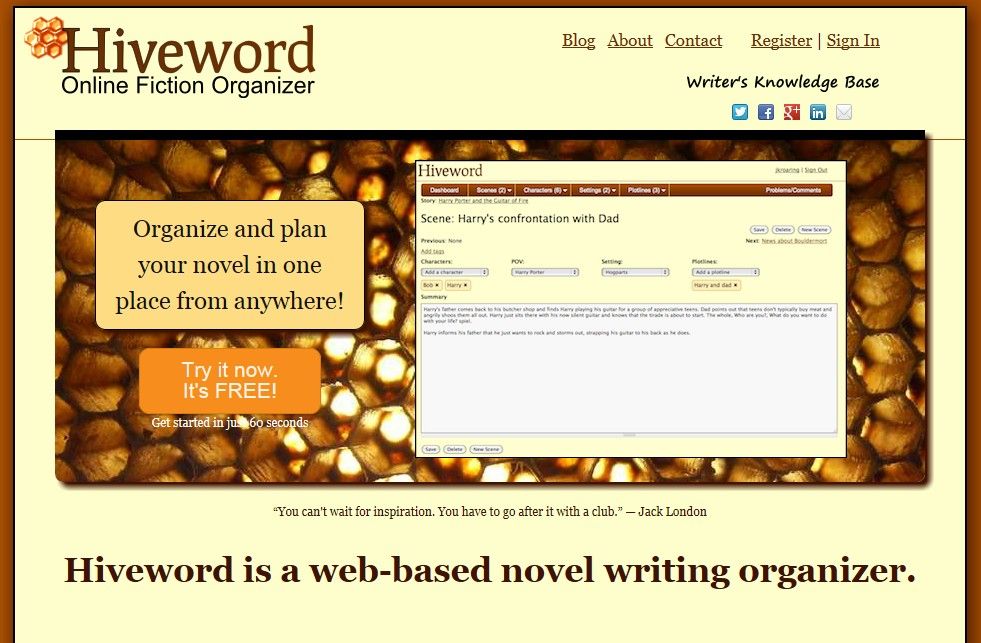
Recently while I was poking around the Writers Knowledge Base site, I discovered Mike Fleming's Hiveword, an amazing web-based story organizer that is easy to use, provides quick and easy outlining of scenes, characters, settings and plotlines, and generates terrific compilation lists of the same. In addition to these features Hiveword also stores your work online for you in a private account, so it's like a virtual version of a novel notebook. Here are details on some of Hiveword's different features along with some screenshots (and click on any image to see a larger version):
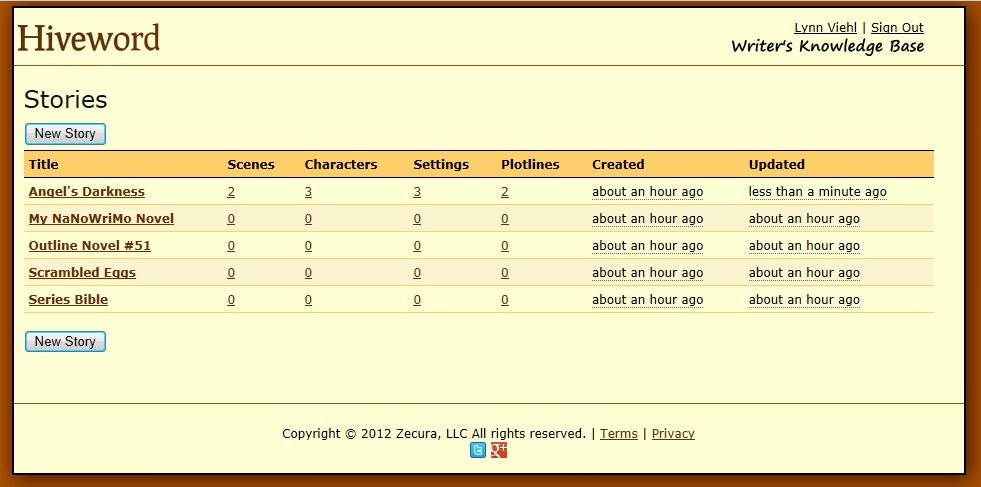
Your Hiveword account includes a dashboard with all your works in progress arranged by title, along with when they were created, stats on how much work you've done on them, and the last time you updated the info. For those of you who like me are quantum writers and work on several projects at the same time, this can help you track your progress and productivity on multiple WIPs.
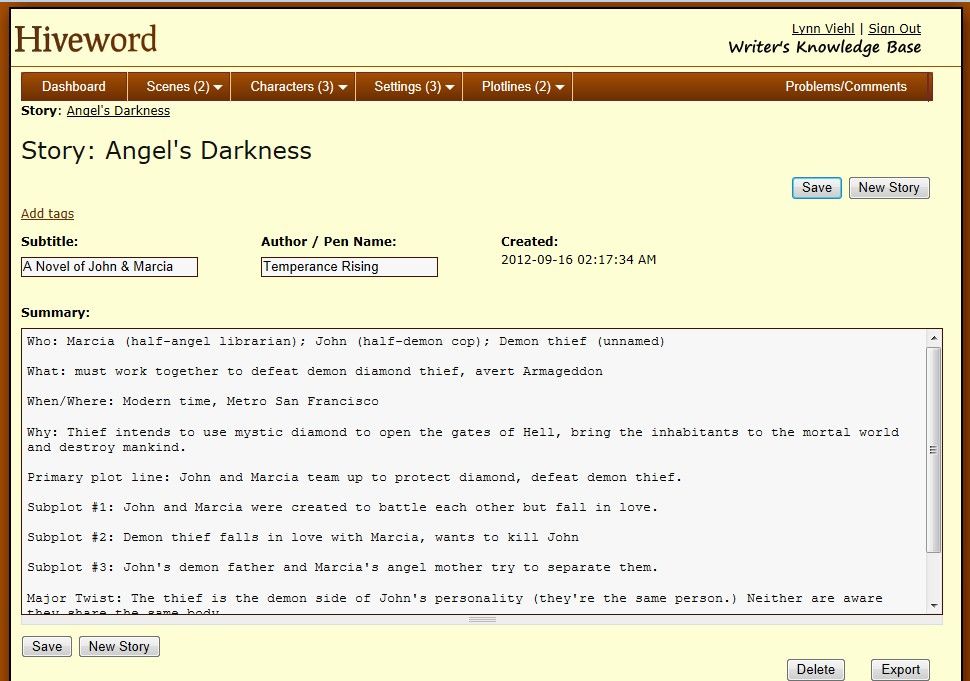
Each story you archive on Hiveword has a main title page where you can record a subtitle, what name you're writing under, and a summary of the story. Here I've plugged in the summary for my novel crash dummies' book, and the summary area is a great place to work on a draft of your outline or synopsis.
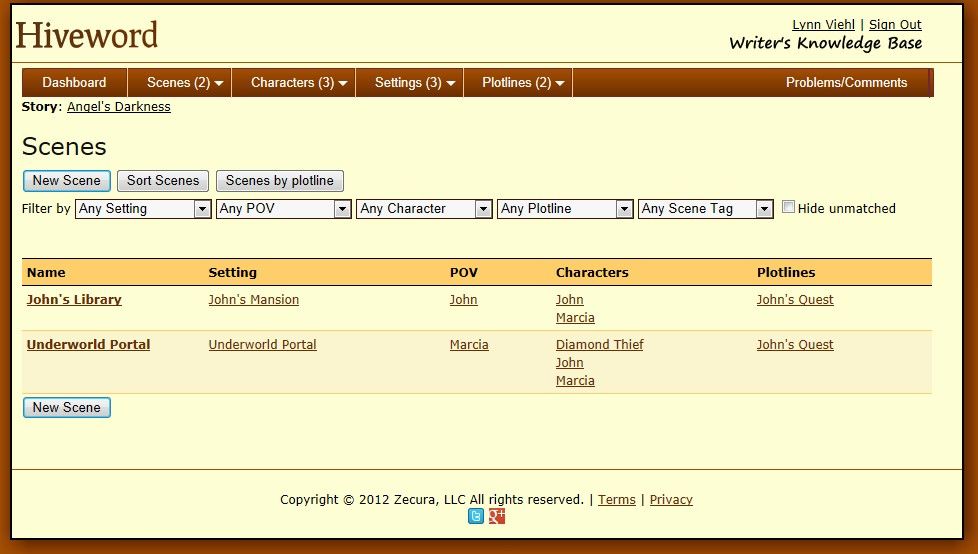
As you compile scenes on Hiveword, it keeps track of them, and generates a list of them for each project. This is great because you can track how often you switch settings, POV, plotlines and keep track of who appears in what scene.
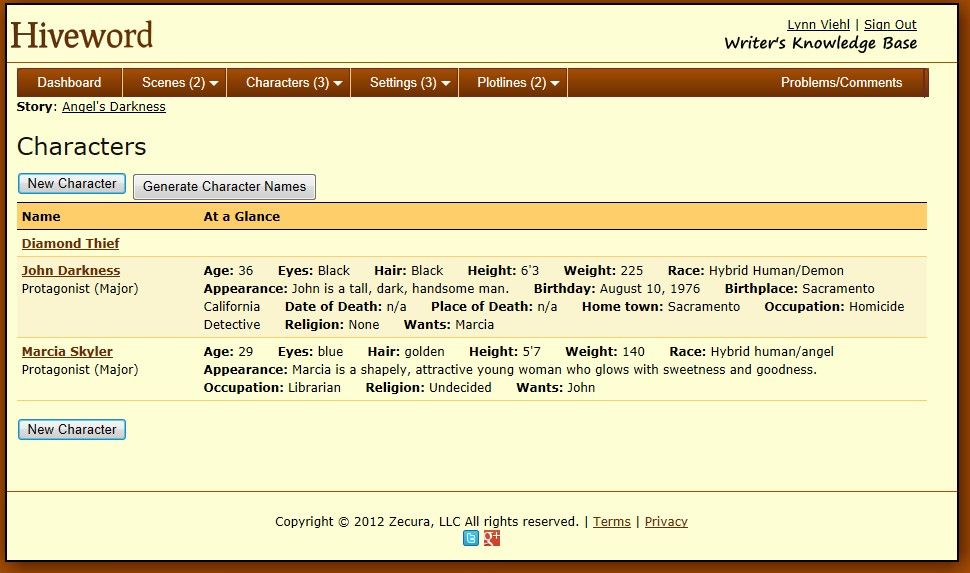
Hiveword also compiles lists of your characters as you make them up and provides an at-a-glance summary of things like attributes, occupations, motivations, etc. If you're working on a project with a big cast of characters I don't have to tell you how valuable this is.
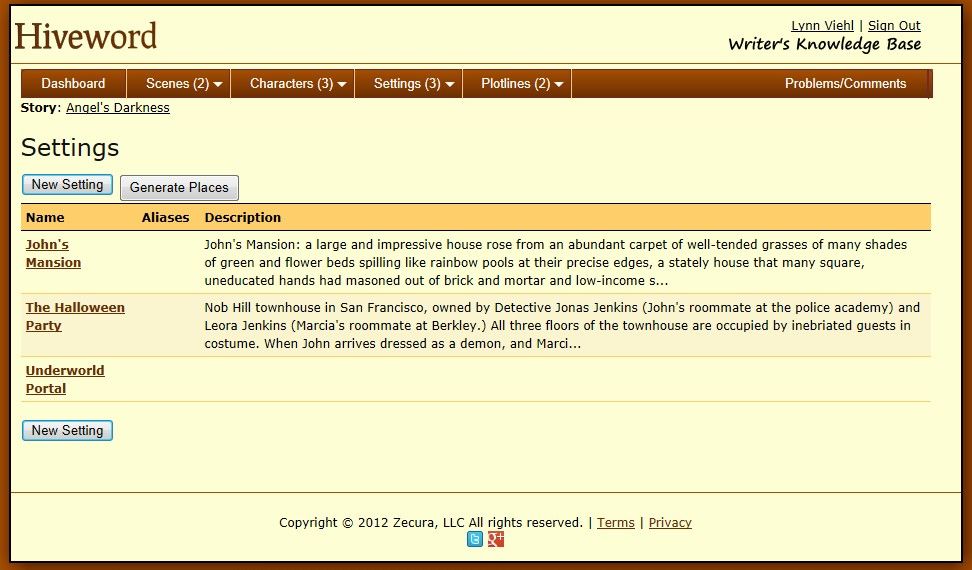
The service also compiles lists of settings in the story, as well as a snapshot of your description of them.
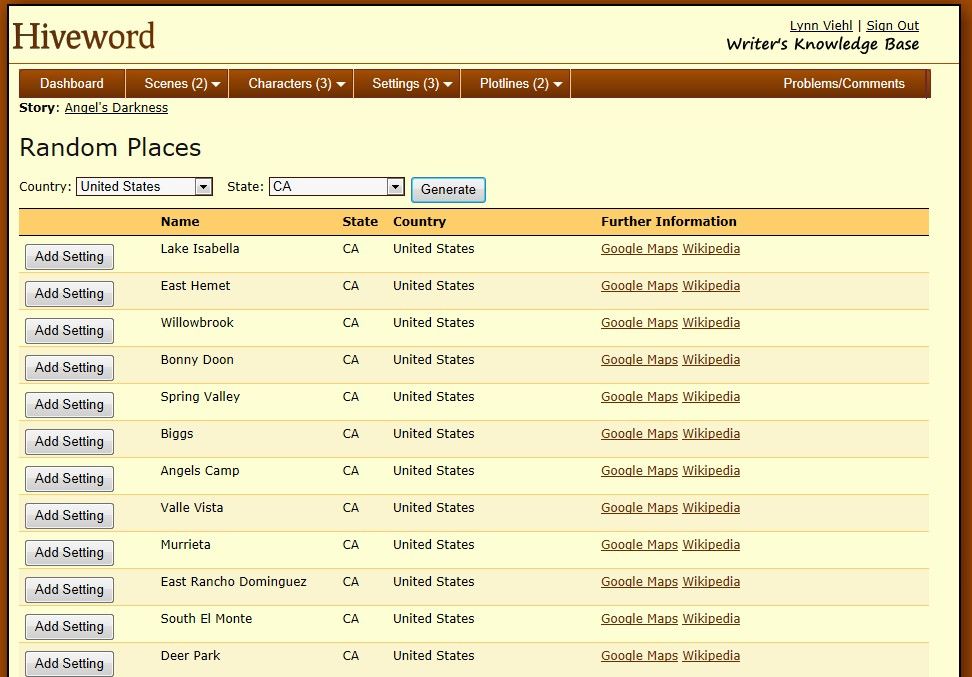
There's a button on the settings list page that offers you the option to you generate place names if you need them, and provides maps and links to info about the generated results. By selecting the "add setting" button you can add any of the results you like directly into your story.
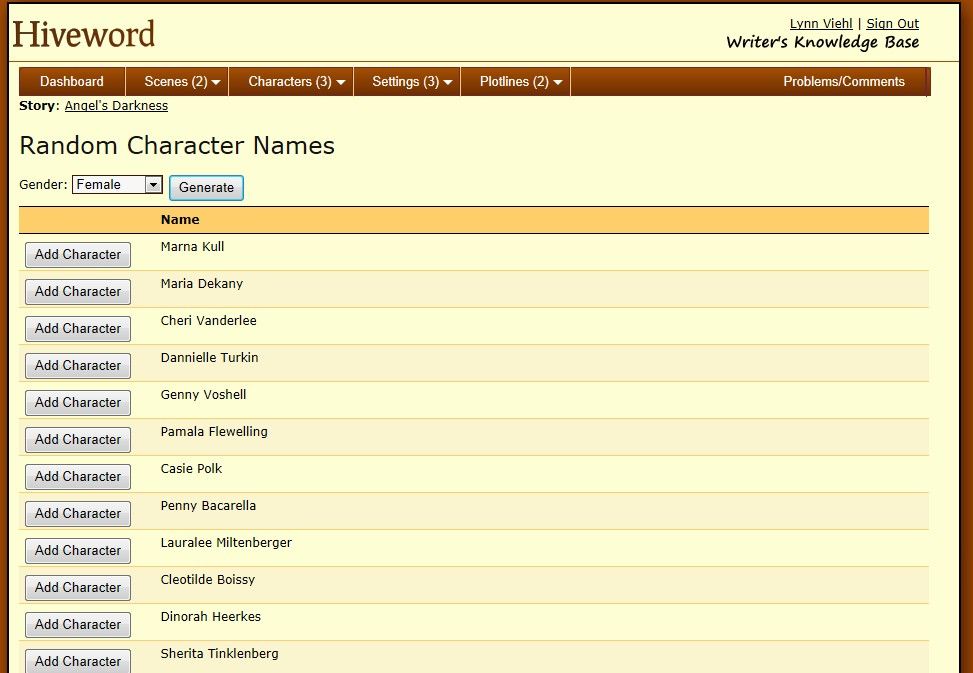
You can also use a similar button to generate random character names, and add those you like from the results to your story.
There is much more to Hiveword than what I've mentioned, so it's worth taking it for a test-drive yourself to see all the features. Hiveword is so great at helping organize your story info and elements that it's like having your own personal story assistant. You can use it for other purposes as well, such as outlining those bright, shiny and very distracting new story ideas so you can get out of your head. For those of you who are series writers, Hiveword would serve as an excellent encyclopedia to keep a running record of your characters, settings, plots and details from every novel. If you're on the phone with an editor, you can consult Hiveword on details from your book for pitches, editorial discussions or to answer those pesky impromptu questions (like "Hey, what Chapter did Marcia find out John was also the demon thief?") You pantsers might not have to backtrack through your manuscripts as much if you take a few minutes after your work sessions to record details of what you've already written in a Hiveword file.
The very best thing about Hiveword is that right now it's free* for anyone to use, so you don't have to pay to play with it (and according to Mike Fleming's blog, he's keeping it free for National Novel Writing Month.) If you're thinking about writing your first novel this November, want to become more organized with ongoing projects, or simply want to play with novel-writing software to see what it can do for you, I highly recommend Hiveword.
*Added: I just learned from the designer that Hiveword is going to be free forever, not just for NaNoWriMo, so one more huge reason to love it.
Labels:
freebies,
Hiveword,
online resources,
organization
Saturday, September 15, 2012
Winner
The winner of the Little Ideas giveaway is:
Freyrryn, when you have a chance please send your full name and ship-to info to LynnViehl@aol.com so I can get your package out to you. My thanks to everyone for joining in.
Freyrryn, who wrote: I've recently started collecting 'tools' to
get back into my old hobby of leather working... mostly small accessory bits and
favorite bookmarks.
Freyrryn, when you have a chance please send your full name and ship-to info to LynnViehl@aol.com so I can get your package out to you. My thanks to everyone for joining in.
Friday, September 14, 2012
Little Ideas
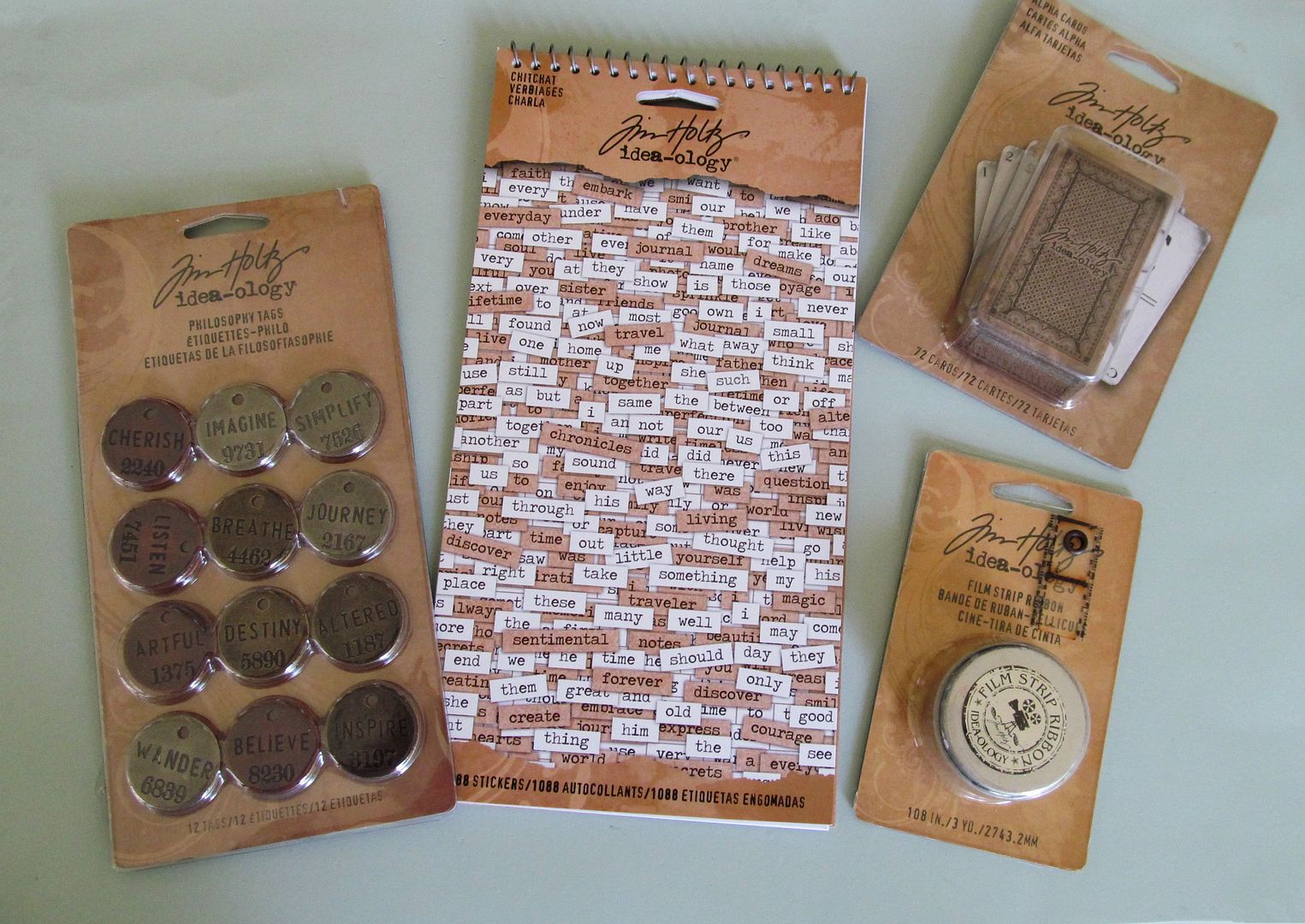 I've gone and fallen in love with Tim Holtz's idea-ology line of art products, which a steampunk-loving friend introduced me to a few months back as inspiration for my jewelry-making as well as my 1K Cards Project. The line mixes antique, metal and artful grunge themes and materials to create that industrial chic that mixed media artists love, and offers unique materials to play with that I think readers and writers can have fun becoming idea-ologists, too. And since Jo-Ann has practically the entire line on sale this week for 30% off, I thought I'd share some of what I'm doing with my stash (and you can click on any image to see a larger version.
I've gone and fallen in love with Tim Holtz's idea-ology line of art products, which a steampunk-loving friend introduced me to a few months back as inspiration for my jewelry-making as well as my 1K Cards Project. The line mixes antique, metal and artful grunge themes and materials to create that industrial chic that mixed media artists love, and offers unique materials to play with that I think readers and writers can have fun becoming idea-ologists, too. And since Jo-Ann has practically the entire line on sale this week for 30% off, I thought I'd share some of what I'm doing with my stash (and you can click on any image to see a larger version.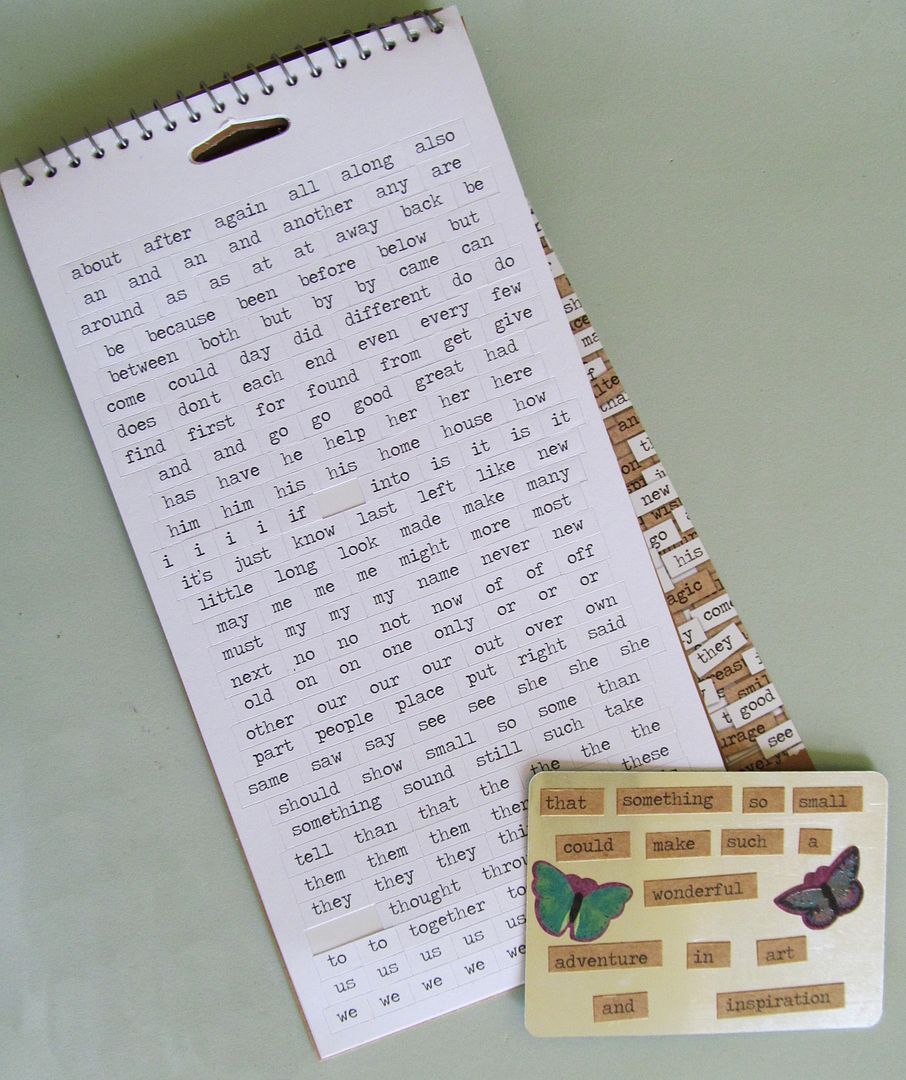 If you've ever wanted to play with a paper version of magnetic poetry, this pad of chitchat stickers is sheer perfection. The pad features 1088 tiny word stickers printed with words in a typewriter-style font; you get two sets (six pages total) of the words, half on white and half on grocery bag-brown card stock backgrounds. I used my pad to compose some ATCs for the project, and found that the words stick very nicely, even to a metal surface. $4.99 for the pad; I paid $3.49 for it on sale at Jo-Ann.
If you've ever wanted to play with a paper version of magnetic poetry, this pad of chitchat stickers is sheer perfection. The pad features 1088 tiny word stickers printed with words in a typewriter-style font; you get two sets (six pages total) of the words, half on white and half on grocery bag-brown card stock backgrounds. I used my pad to compose some ATCs for the project, and found that the words stick very nicely, even to a metal surface. $4.99 for the pad; I paid $3.49 for it on sale at Jo-Ann.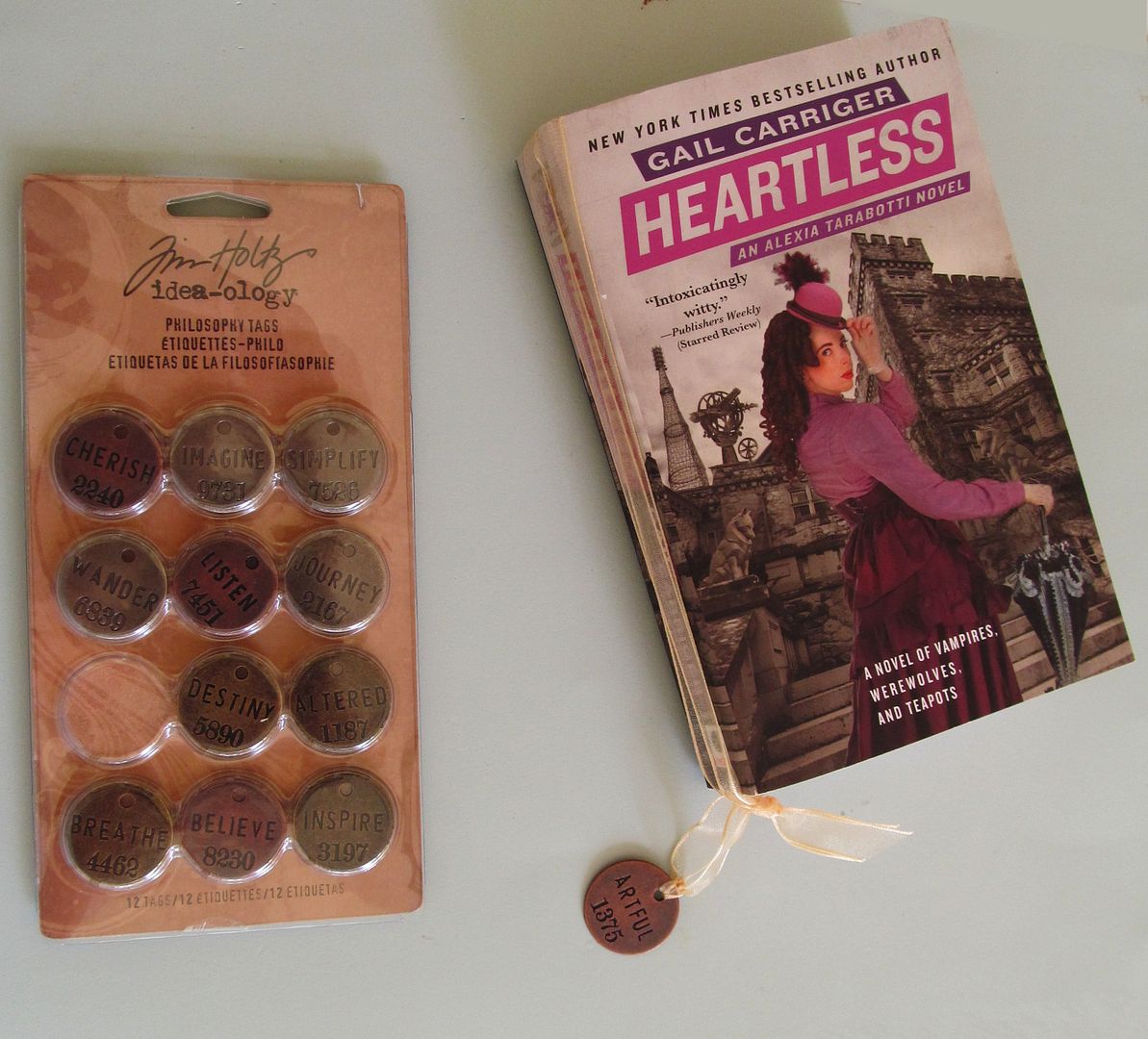 These metal philosophy tags by idea-ology come in a set of twelve, and feature a single inspirational word along with some numbers so they resemble old fashioned stamped key tags. They're great for jewelry-making and innumberable art projects; I've already used a dozen to make some steampunk pieces. If you string them like medals I bet these would make fun awards for any creative club. I bought another set to use them as anchors for some promotional BookLoops; $4.99 regular price, got mine on sale for $3.49 at Jo-Ann.
These metal philosophy tags by idea-ology come in a set of twelve, and feature a single inspirational word along with some numbers so they resemble old fashioned stamped key tags. They're great for jewelry-making and innumberable art projects; I've already used a dozen to make some steampunk pieces. If you string them like medals I bet these would make fun awards for any creative club. I bought another set to use them as anchors for some promotional BookLoops; $4.99 regular price, got mine on sale for $3.49 at Jo-Ann.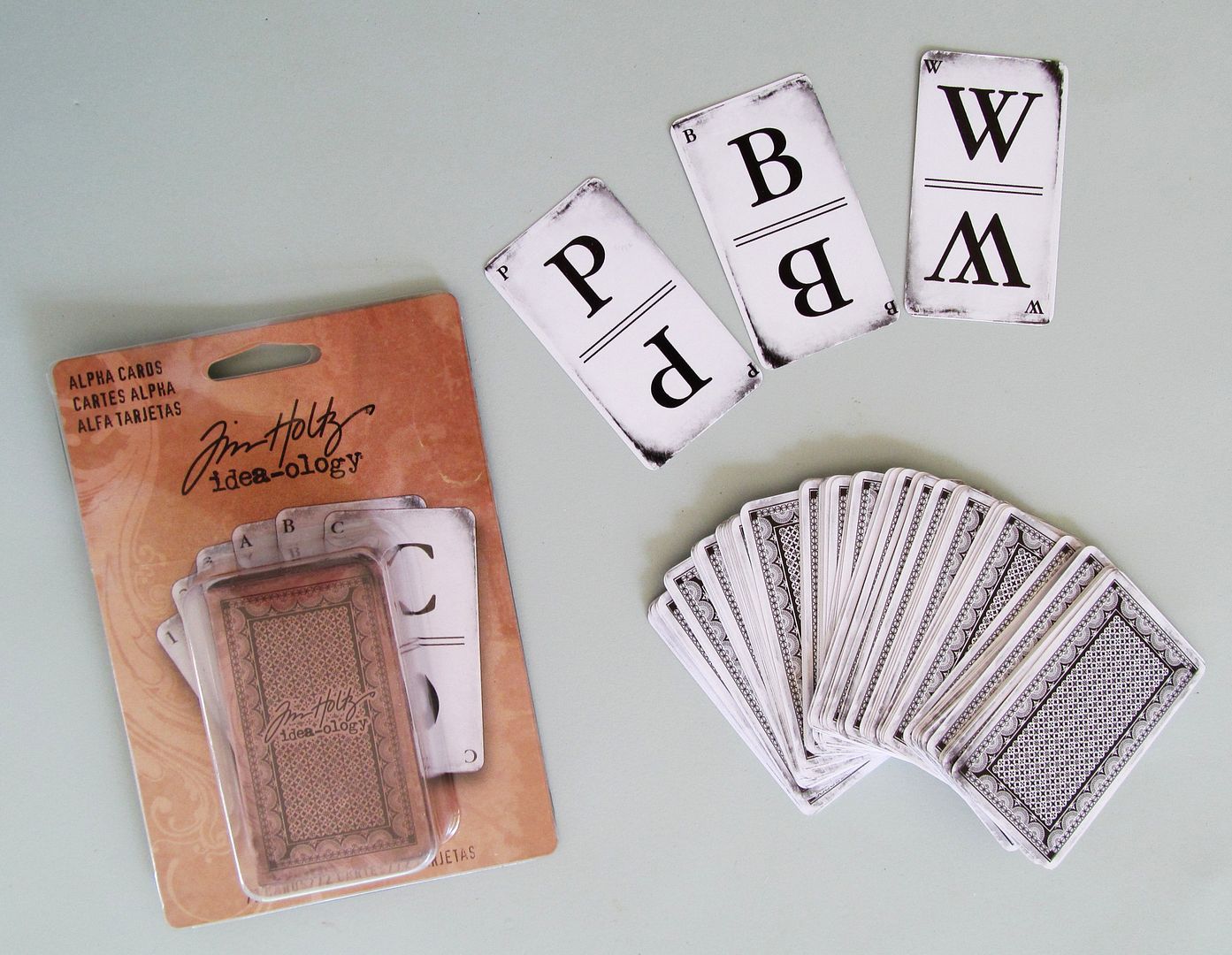 I've always looked around for a not-childish set of of mini alphabet flash cards to use with my art projects, and here's one that comes with 72 count (mostly letters but numbers 1-9, too.) These will help spell out a set of 26 ATCs I'm making to pay homage to back-to-school month, but you can also use them to embellish journal covers and pages, to creatively tab a novel notebook or anything you keep in alphabetical or numerical order. $3.99 regular price; Jo-Ann has them for $2.79.
I've always looked around for a not-childish set of of mini alphabet flash cards to use with my art projects, and here's one that comes with 72 count (mostly letters but numbers 1-9, too.) These will help spell out a set of 26 ATCs I'm making to pay homage to back-to-school month, but you can also use them to embellish journal covers and pages, to creatively tab a novel notebook or anything you keep in alphabetical or numerical order. $3.99 regular price; Jo-Ann has them for $2.79. If you like the look of vintage film strip, this spool of mini transparent plastic movie frames is beyond cool. It feels and looks like the real thing, and when used as a border for matted photos or journal pages adds a neat antique look. I do want to mention that because it's made of plastic this ribbon remains in a curly state (you experienced mixed-media artists probably know some clever way to use a hair dryer or something to solve that) so it isn't very glue-friendly, but I secured my photo border on the ends with double-sided foam tape, which worked fine. This spool was a gift from my pal, but I checked Jo-Ann's web site and they have it for $3.49 on sale.
If you like the look of vintage film strip, this spool of mini transparent plastic movie frames is beyond cool. It feels and looks like the real thing, and when used as a border for matted photos or journal pages adds a neat antique look. I do want to mention that because it's made of plastic this ribbon remains in a curly state (you experienced mixed-media artists probably know some clever way to use a hair dryer or something to solve that) so it isn't very glue-friendly, but I secured my photo border on the ends with double-sided foam tape, which worked fine. This spool was a gift from my pal, but I checked Jo-Ann's web site and they have it for $3.49 on sale.What I like most about this product line is that nothing costs an arm and a leg; the materials only look like they do. For example, with the philosophy tags I can make a dozen cool BookLoops for under $5 (a spool of organdy ribbon from the dollar store + the 12 tags as anchors = $4.49 total.) Tim Holz also has some instructional videos here that show you more creative ways to use some of the other idea-ology products.
I'd also like to share some of the idea-ology wealth, so in comments to this post name a creative way you'd like to use one of these products (or if you can't think of one, just toss your name in the magic hat) by midnight EST tonight, September 14, 2012. I'll draw one name at random from everyone who participates, and send the winner one set of all the products I've mentioned in this post (the chitchat pad,the philosophy tags, the mini alphabet deck and the movie frames ribbon.) This giveaway is open to everyone on the planet, even if you've won something here at PBW in the past.
Thursday, September 13, 2012
Winner
The Publishing Fairy came through for me again, and the winner of yesterday's BookWish giveaway is:
Deb Salisbury, who wrote: Nancy Athertons's Aunt Dimity mysteries
always make me happy. I reread them whenever I'm blue.
Deb, when you have a chance please send your ship-to info and title of the book you'd like, and I'll get Miss Magic Dust to put her wand to work. My thanks to everyone for joining in and giving us so many great recs for happy reads.
Wednesday, September 12, 2012
In Lieu of a Post
 I had a lousy day yesterday, and I'm not happy with the post I had written to appear today, so to bail me out (again) I've summoned the Publishing Fairy, who has taken pity on me and agreed to give someone who stops in here today a book that they want (she's such a pushover.)
I had a lousy day yesterday, and I'm not happy with the post I had written to appear today, so to bail me out (again) I've summoned the Publishing Fairy, who has taken pity on me and agreed to give someone who stops in here today a book that they want (she's such a pushover.)If you'd like to be that someone, in comments to this post name a book or author that makes you happy (or if you can't think of one, just toss your name in the magic hat) by midnight EST tonight, September 12, 2012. I'll draw one name at random from everyone who participates and grant the winner a BookWish*. This giveaway is open to everyone on the planet, even if you've won something here at PBW in the past.
Also, a note on that last bit -- I am blessed with an amazingly supportive readership, not only here in the U.S. but around the globe. Keeping my giveaways open to everyone no matter what country they reside is my own little Books Without Borders project -- and a chance to say thanks for that support. So if you do live outside the U.S. and worry about this, please don't hesitate -- enter the giveaway, and if you win, I will get it to you, no problem whatsoever.
*A BookWish is any book of the winner's choice available for order online and that costs up to a maximum of $30.00 U.S. dollars (I'll cover any additional shipping costs involved.)
Tuesday, September 11, 2012
Poetry Sparks
Whenever I need inspiration for a particular storytelling task the first place I usually run to is my collection of poetry books. Great poets have the gift of expressing concepts with the most uncommon words and phrases, and gleaning and recombining fragments from these verses often results in a unique title or story idea.
To try this yourself, pick up a few poetry books at the library, grab a notepad and pen, and start reading. When you find a phrase that has appeal to you as a title concept or story inspiration, jot it down (and remember to note the author and the title of the poem so you can go back to it, cite it, etc.)
Here's a list of title sparks I made while reading through The Poetry of Pablo Neruda:
Poetry is also a great place to find story sparks; poets tend to load up their verses with devious imagery and ideas. If you're in an inspirational lull you might find a word or phrase that spontaneously jump starts your muse.
Here's a list of some story ideas I got while reading through Ranier Marie Rilke ~ Prose and Poetry:
Sometimes when you mine poetry you'll get a mixed bag, especially if you read through an anthology with verses written by many different poets. Here's a mixed sparks list I put together while sifting through Poetry That Lives Forever:
Getting sparks from poetry is also a great way to break through a writing block; try looking for words and phrases that create instant imagery and resonate on some level with you. Once you have a list of ten, write out a short premise on what they brought to mind, and then choose one and write one page about it. If the idea doesn't hold your interest, go back to your list, choose another premise and repeat. Even if you don't end up with a complete story, it's great writing practice and might help you get past whatever is blocking you.
To try this yourself, pick up a few poetry books at the library, grab a notepad and pen, and start reading. When you find a phrase that has appeal to you as a title concept or story inspiration, jot it down (and remember to note the author and the title of the poem so you can go back to it, cite it, etc.)
Here's a list of title sparks I made while reading through The Poetry of Pablo Neruda:
- habit of dreams (Joachim's Absence)
- fallen night (We Together)
- between garrisons and maidens (Ars Poetica)
- the moon dwells (Sonata and Destruction)
- her dark star (The Night of the Soldier)
- I listen to my tiger (The Young Monarch)
- garden in the dark (Single Gentleman)
- dreaming of bandits (Sexual Water)
- the midst of rain (Autumn Returns)
- stones of silence (What Spain Was Like)
Poetry is also a great place to find story sparks; poets tend to load up their verses with devious imagery and ideas. If you're in an inspirational lull you might find a word or phrase that spontaneously jump starts your muse.
Here's a list of some story ideas I got while reading through Ranier Marie Rilke ~ Prose and Poetry:
- shadow's falling (The Book of Hours)
- signs of winter (The Fourth Elegy)
- angel gaze (The Seventh Elegy)
- Lords of the House of Lament (The Tenth Elegy)
- with early death (The Tenth Elegy)
- fall of light (The Sonnets to Orpheus, #22)
- racks no longer required (The Sonnets to Orpheus, #9)
- shade or shine (The Sonnets to Orpheus, #29)
- night without objects (The Notebooks of Malte Laurids Brigge)
- those who burned their letters (The Notebooks of Malte Laurids Brigge)
Sometimes when you mine poetry you'll get a mixed bag, especially if you read through an anthology with verses written by many different poets. Here's a mixed sparks list I put together while sifting through Poetry That Lives Forever:
- When his wings enfold (Of Love, Kahlil Gibran)
- A whiplash unbraiding (A Narrow Fellow, Emily Dickinson)
- Not yet in quiet lie (Daybreak, Henry Wadsworth Longfellow)
- speak silence (To the Evening Star, William Blake)
- with spiders I have friendship made (The Prisoner of Chillon, Lord Byron)
- too hot the eye of heaven (Sonnet XVIII, William Shakespeare)
- all the pleasures prove (The Passionate Shepherd to His Love, Christopher Marlowe)
- at sundawn stirred (A Child's Laughter, Charles Algernon Swinburne)
- halls of pleasure . . . aisles of pain (Solitude, Ella Wheeler Wilcox)\
- the one less traveled (The Road Not Taken, Robert Frost)
Getting sparks from poetry is also a great way to break through a writing block; try looking for words and phrases that create instant imagery and resonate on some level with you. Once you have a list of ten, write out a short premise on what they brought to mind, and then choose one and write one page about it. If the idea doesn't hold your interest, go back to your list, choose another premise and repeat. Even if you don't end up with a complete story, it's great writing practice and might help you get past whatever is blocking you.
Subscribe to:
Posts (Atom)
